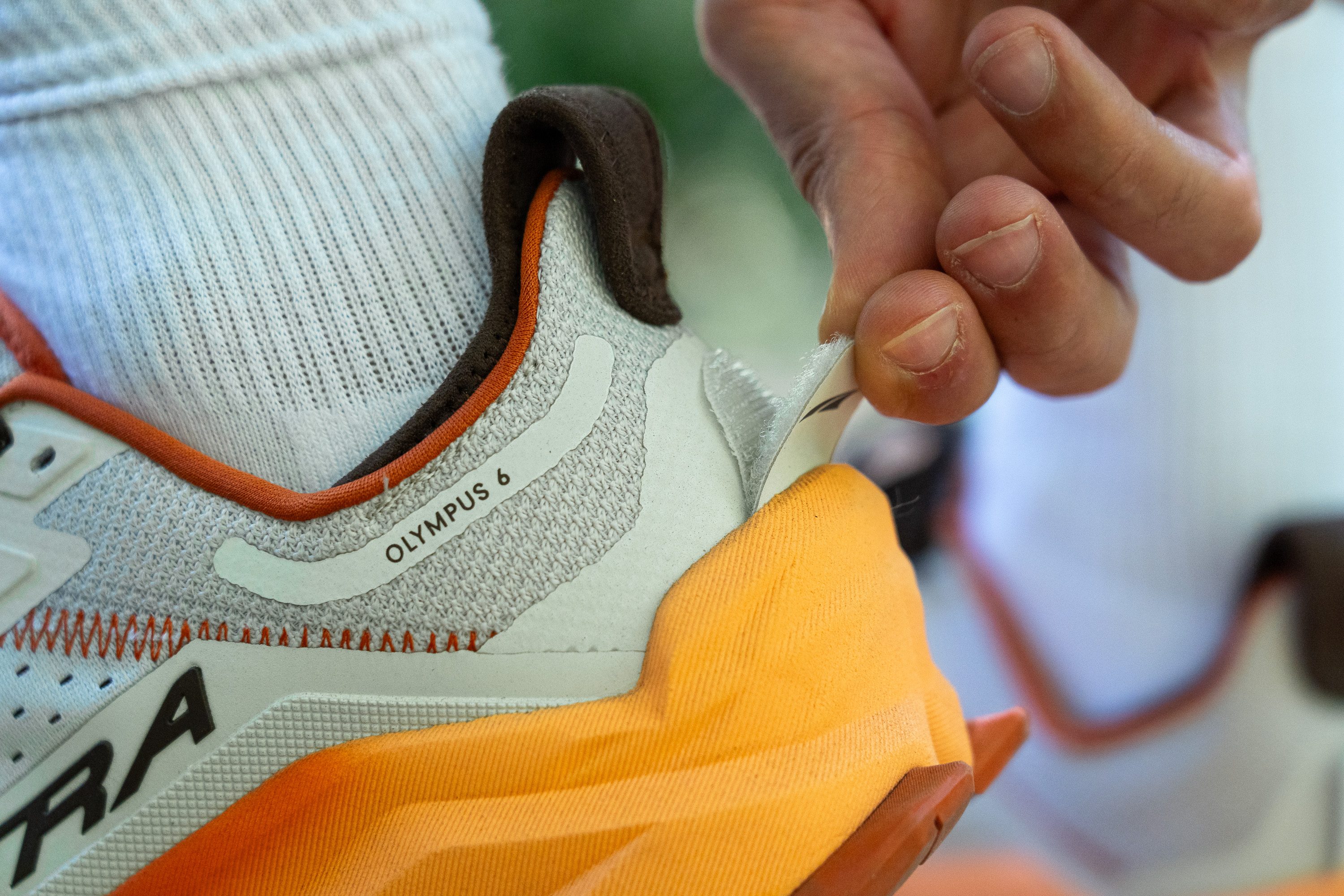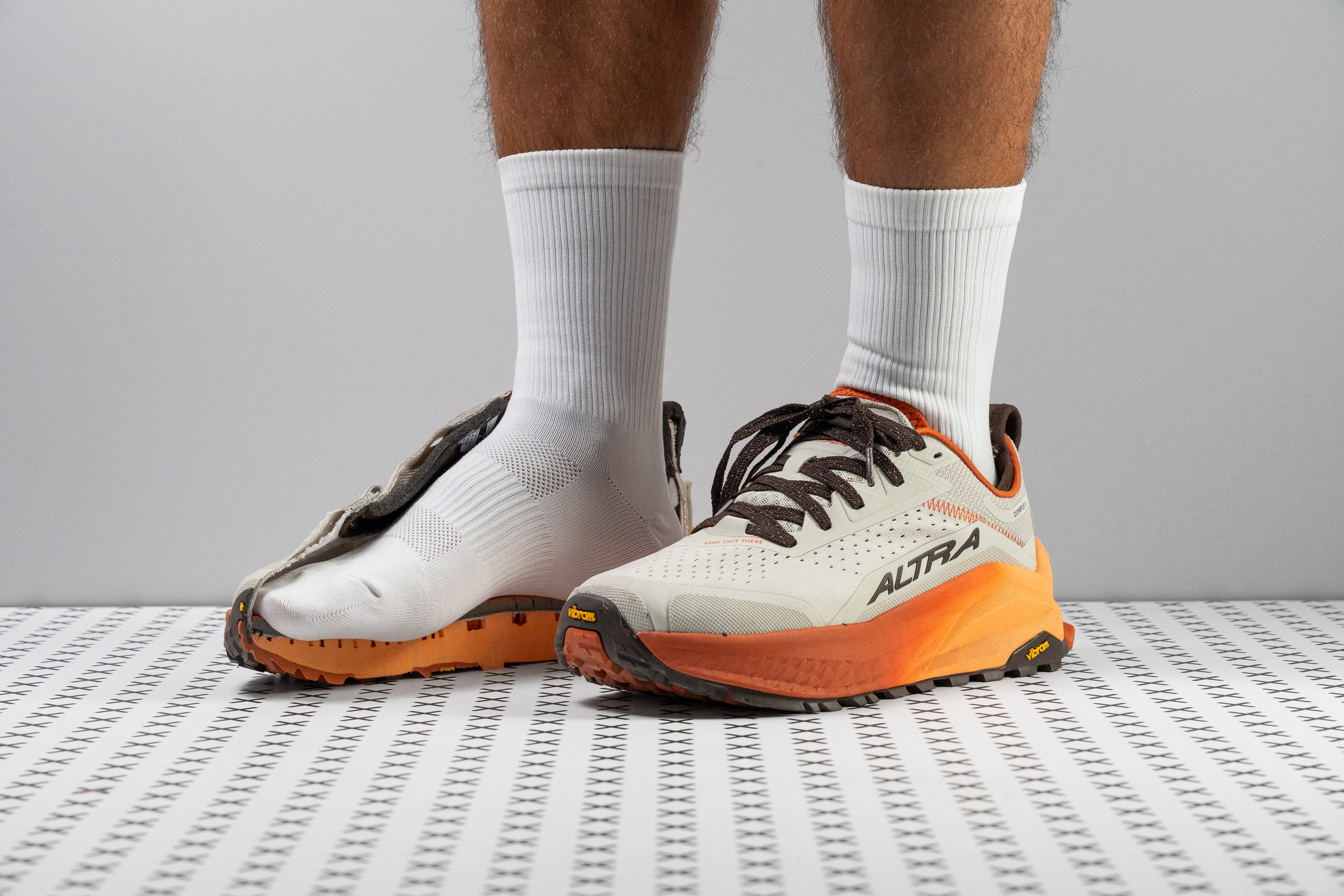Our verdict
- Top pick in best running shoes for heavy men
- Top pick in best Altra trail running shoes
Pros
- Outstanding durability
- Superior build quality
- Grippy Vibram outsole
- Exceptionally comfortable
- Real 0-mm drop
- Ready for the toughest adventures
- Spacious, foot-shaped toebox
- Premium quality materials
Cons
- Extremely heavy
- Slight price increase
- Lacks energy return
Audience verdict
Comparison
The most similar running shoes compared
+ + Add a shoe | |||||
|---|---|---|---|---|---|
| Audience score | 81 Good! | 80 Good! | 91 Superb! | 82 Good! | |
| Price | $175 | $155 | $140 | $185 | |
| Trail terrain | LightModerate | LightModerate | LightModerate | Light | |
| Shock absorption | Moderate | Moderate | Low | Moderate | |
| Energy return | Moderate | Low | Moderate | Low | |
| Traction | - | - | - | High | |
| Arch support | Neutral | Neutral | Neutral | Neutral | |
| Weight lab Weight brand | 12.6 oz / 357g 12.5 oz / 354g | 9.5 oz / 269g 9.8 oz / 277g | 10.9 oz / 309g 10.4 oz / 295g | 10.7 oz / 303g 10.8 oz / 305g | |
| Drop lab Drop brand | 0.7 mm 0.0 mm | -0.1 mm 0.0 mm | 0.0 mm 0.0 mm | 0.3 mm 0.0 mm | |
| Strike pattern | Mid/forefoot | Mid/forefoot | Mid/forefoot | Mid/forefoot | |
| Size | Slightly small | Half size small | True to size | - | |
| Midsole softness | Balanced | Balanced | Balanced | Balanced | |
| Difference in midsole softness in cold | Normal | Small | Normal | Small | |
| Toebox durability | Very good | Good | Decent | Good | |
| Heel padding durability | Good | Decent | Decent | Decent | |
| Outsole durability | Good | Good | Good | Good | |
| Breathability | Breathable | Moderate | Warm | Moderate | |
| Width / fit | Medium | Wide | Wide | Wide | |
| Toebox width | Wide | Wide | Wide | Wide | |
| Stiffness | Stiff | Stiff | Moderate | Moderate | |
| Torsional rigidity | Stiff | Stiff | Moderate | Stiff | |
| Heel counter stiffness | Moderate | Moderate | Flexible | Flexible | |
| Lug depth | 3.5 mm | 3.0 mm | 3.8 mm | 3.5 mm | |
| Heel stack lab Heel stack brand | 32.2 mm 35.0 mm | 28.6 mm 29.0 mm | 23.3 mm 25.0 mm | 30.8 mm 33.0 mm | |
| Forefoot lab Forefoot brand | 31.5 mm 35.0 mm | 28.7 mm 29.0 mm | 23.3 mm 25.0 mm | 30.5 mm 33.0 mm | |
| Widths available | Normal | Normal | NormalWide | Normal | |
| For heavy runners | ✓ | ✗ | ✗ | ✗ | |
| Season | SummerAll seasons | All seasons | All seasons | All seasons | |
| Removable insole | ✓ | ✓ | ✓ | ✓ | |
| Orthotic friendly | ✓ | ✓ | ✓ | ✓ | |
| Ranking | #298 Bottom 22% | #319 Bottom 16% | #25 Top 7% | #288 Bottom 24% | |
| Popularity | #115 Top 31% | #146 Top 39% | #41 Top 11% | #240 Bottom 37% |
Who should buy
We believe the Altra Olympus 6 is an excellent trail shoe for:
- Adventurers tackling the most rugged, challenging trails who need exceptional durability and love the unmatched toe splay offered by a foot-shaped toebox.
- Fans of the Olympus series willing to accept a slight weight increase in exchange for major improvements.
- Trail runners seeking a zero-drop shoe with outstanding stack height, top-tier durability, and superior build quality for any kind of long-distance runs or hikes.
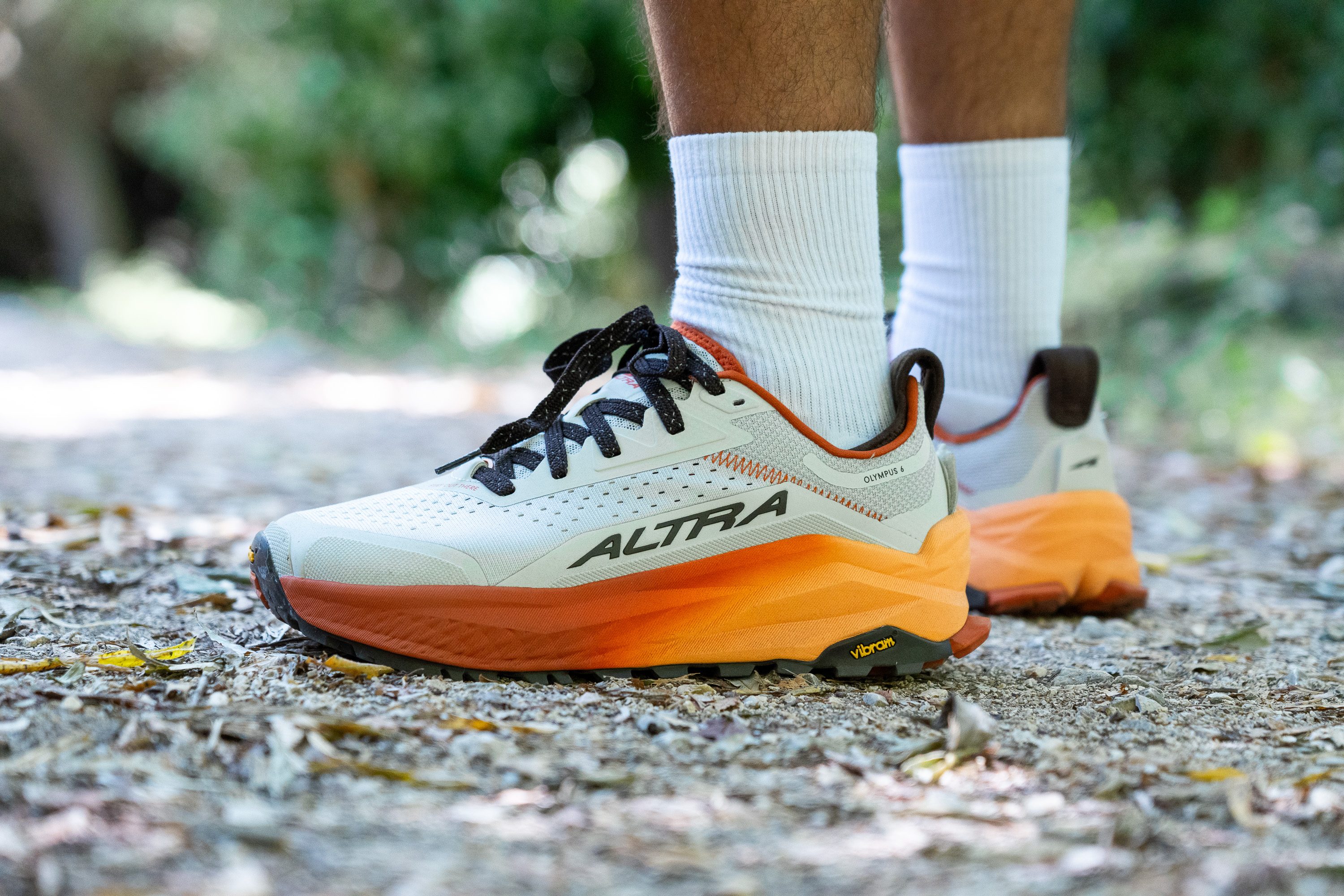
Who should NOT buy
If you're searching for a lightweight, cushioned trail running shoe, the Altra Olympus 6 isn’t the answer. In our lab, we found it to be one of the heaviest shoes we’ve tested and we do not recommend it for those prioritizing a lighter ride. Instead, we think the ASICS Trabuco Max 3 and Brooks Caldera 7 offer a better balance of weight and cushioning.
We also believe the Olympus 6 falls short when it comes to energy return, especially considering its high price. In our experience, the midsole lacks the responsiveness many runners seek nowadays. For those wanting more bounce for their buck, we recommend taking a look at the Nike Zegama 2 or the Saucony Xodus Ultra 3, which deliver a more responsive ride.
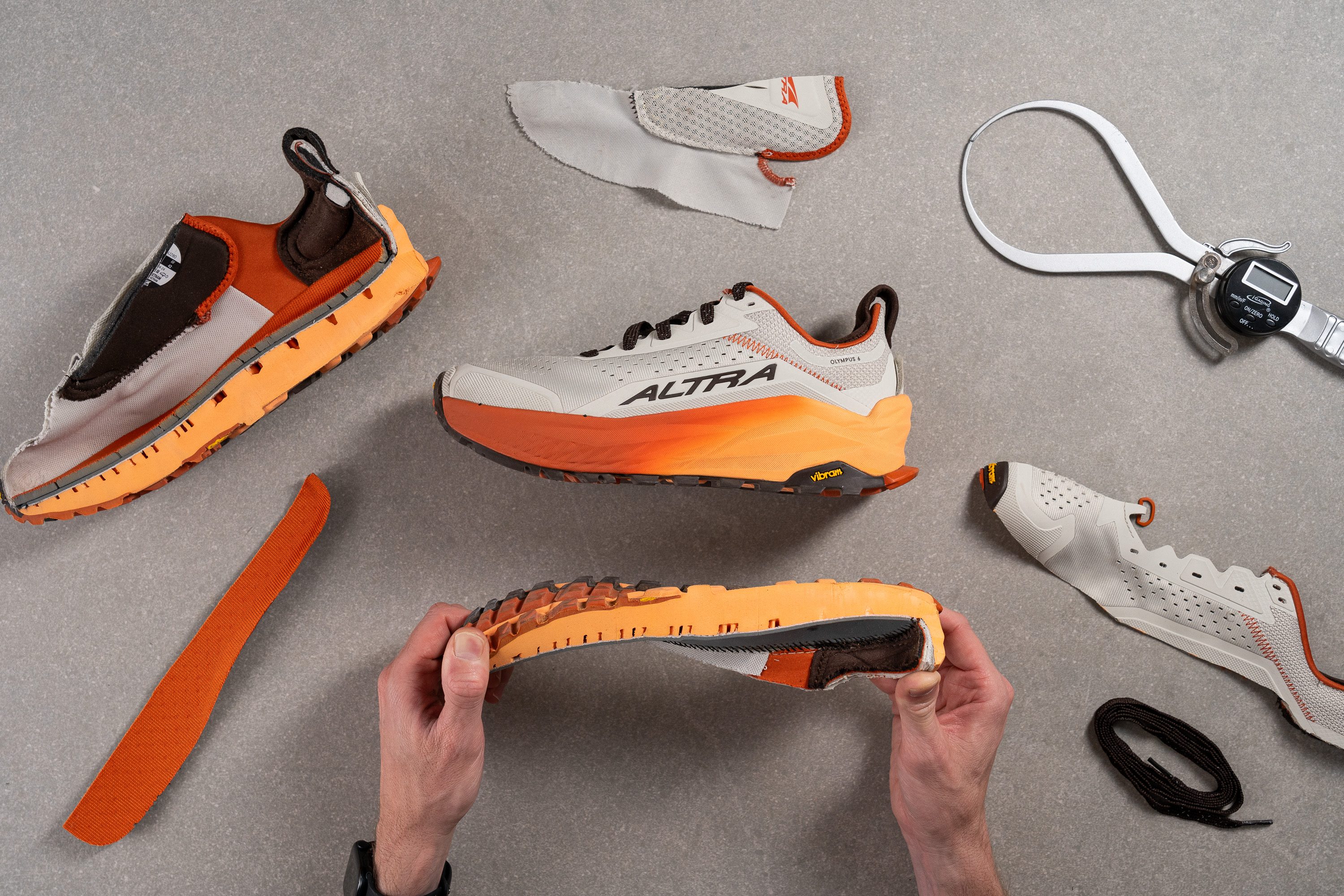
Cushioning
Shock absorption
With the Olympus 6, we can now say Altra covers all bases when it comes to cushioning—keeping the Lone Peak series for runners who prefer a firmer and grounded ride, and offering this comfort-loaded option for those seeking max joint protection.
We tested it in the lab and confirmed solid results: 123 SA in the heel and an outstanding 120 SA in the forefoot, thanks to the zero-drop layout.
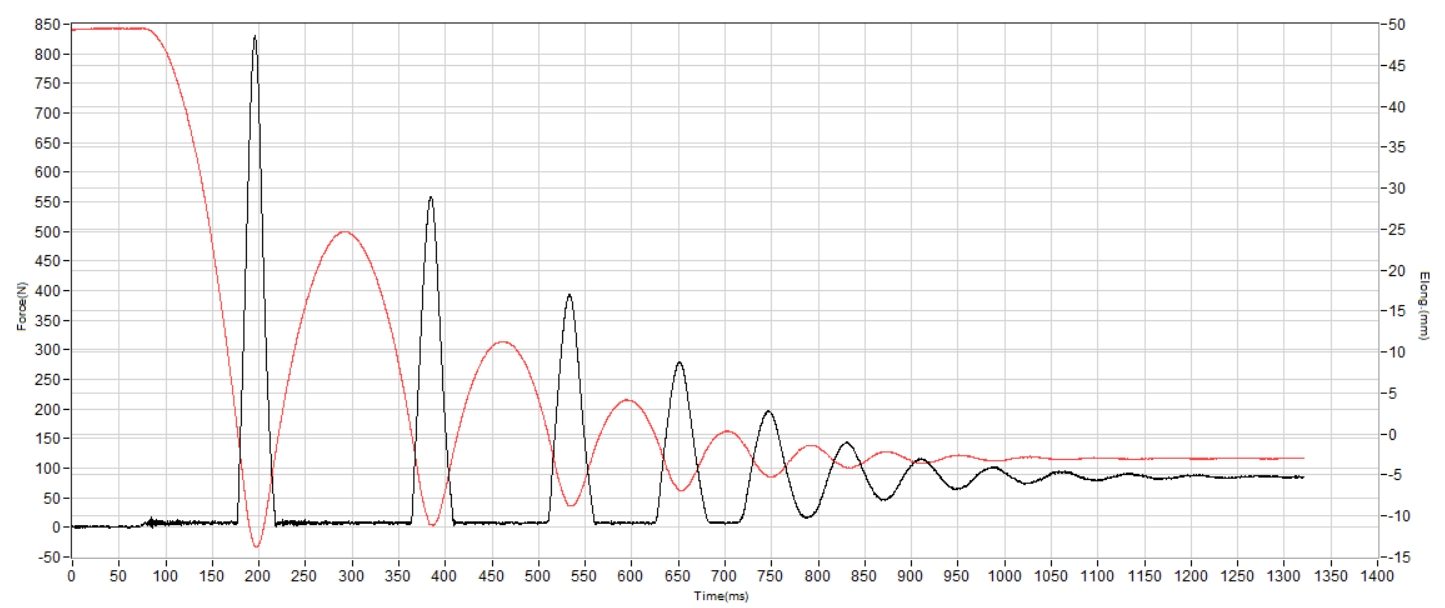
| Olympus 6 | 123 SA |
| Average | 122 SA |
Energy return
The Olympus 6 doesn’t feel like a trampoline, but it’s not overly flat either. It lands somewhere in the middle with 56.1% energy return. We think that it's not bad at all, though there’s room for improvement in version 7, especially given the high price tag.
| Olympus 6 | 56.1% |
| Average | 55.3% |
Heel stack
Given its colossal weight and size, one might expect the Olympus 6 to have a stack height comparable to maximalist running shoes, but here's another surprise—we found the heel stack height is only 32.2 mm.
However, there's a crucial detail to consider—this is a zero-drop shoe, designed to promote a natural running technique where landing on the midfoot or forefoot is ideal. Therefore, the heel stack height isn’t the primary concern, but our next test is.
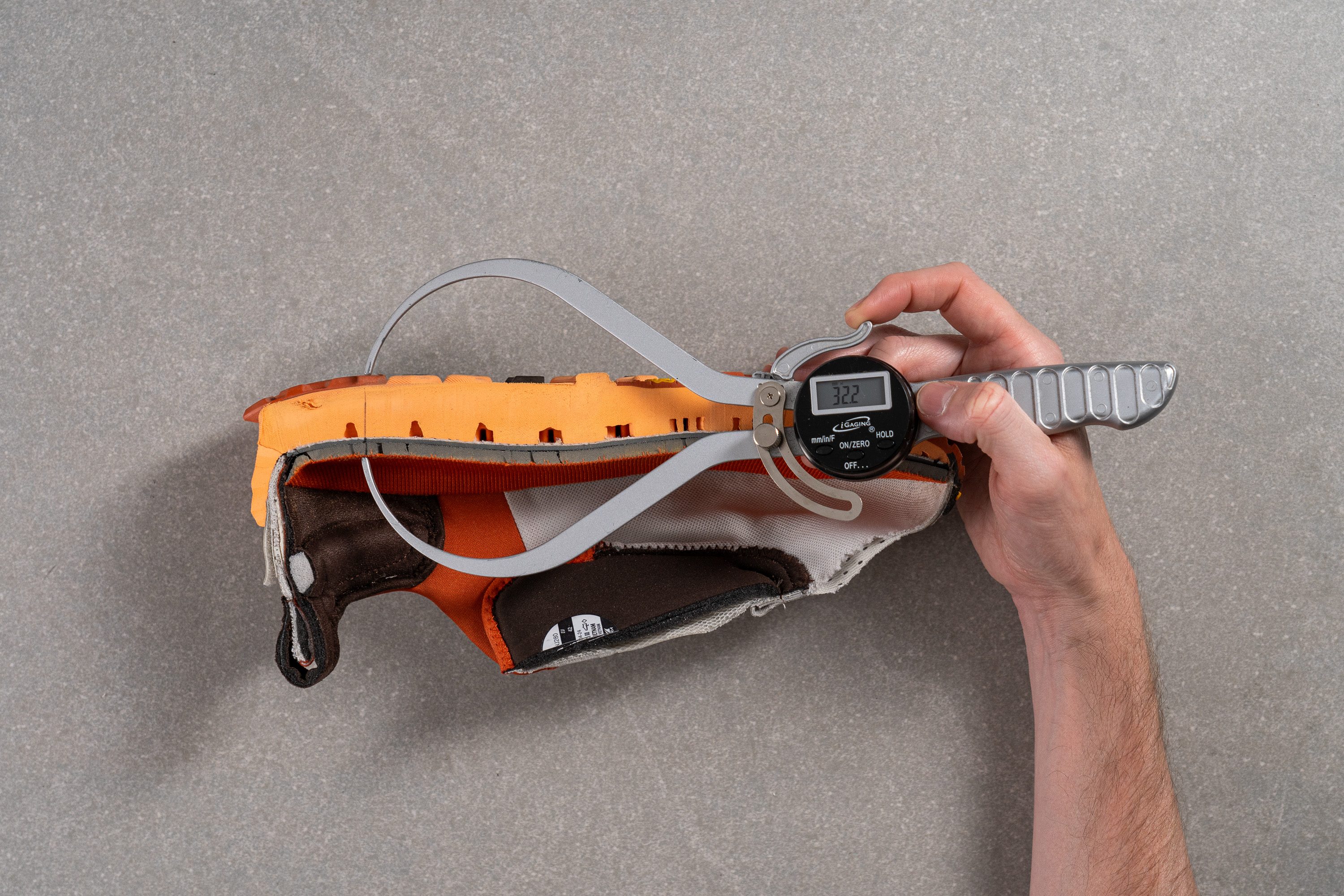
| Olympus 6 | 32.2 mm |
| Average | 32.6 mm |
Forefoot stack
The forefoot boasts 31.5 mm of cushioning, ranking it among the most protective trail running shoes we've ever tested in the lab. As we've mentioned before, in a zero-drop running shoe, this forefoot measurement is particularly significant.
Exceeding 30 mm of stack naturally affects the weight, as we've previously observed. However, this shoe is designed for long-distance or even multi-day endeavors, where maximum underfoot cushioning is crucial. And if you don't need such gargantuan stack, Altra offers more agile options like the Lone Peak 8.
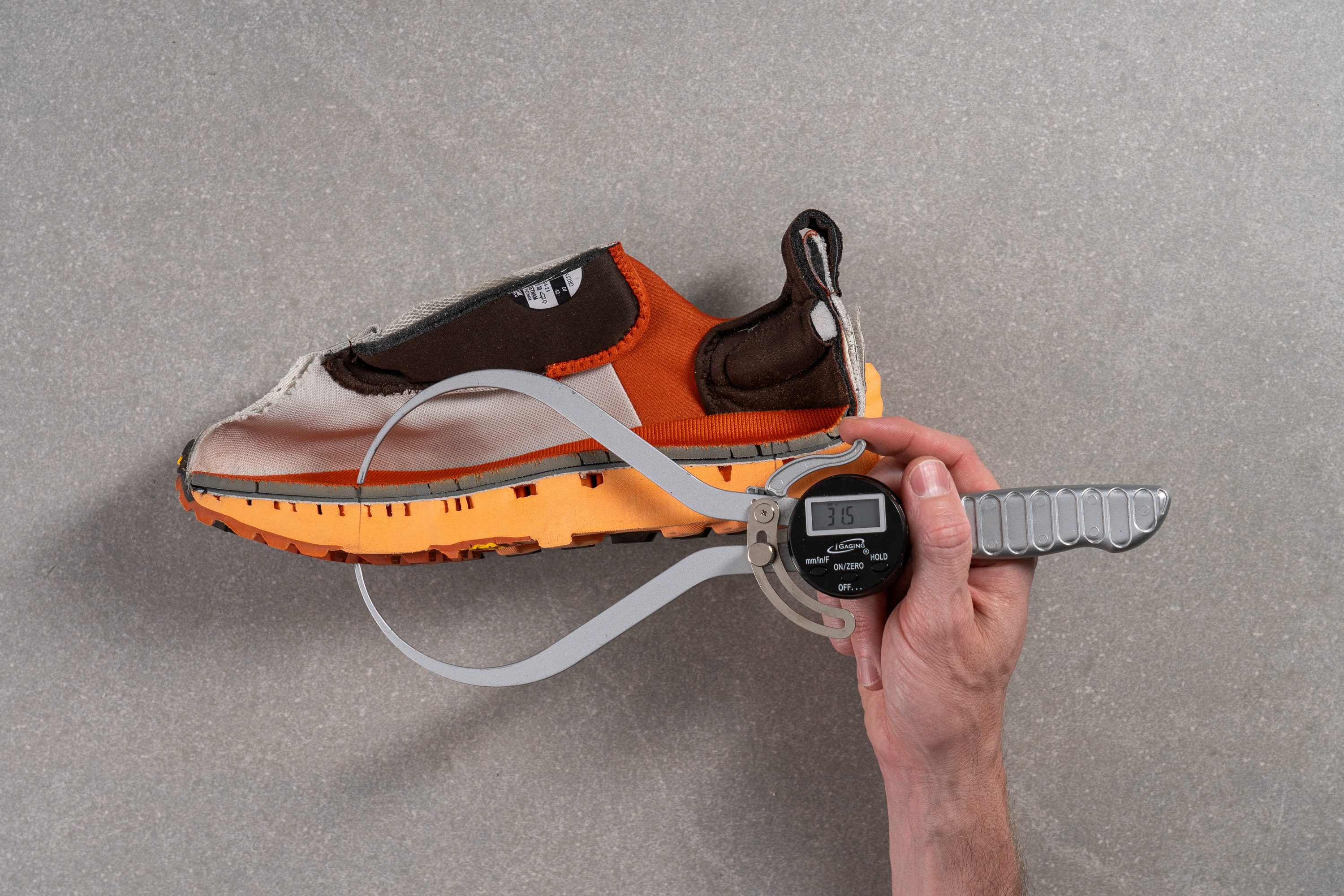
| Olympus 6 | 31.5 mm |
| Average | 25.1 mm |
Drop
We discovered a real 0.7 mm drop, which earns our RunRepeat seal of approval, as any variance below 1-2 mm indicates superior build quality.
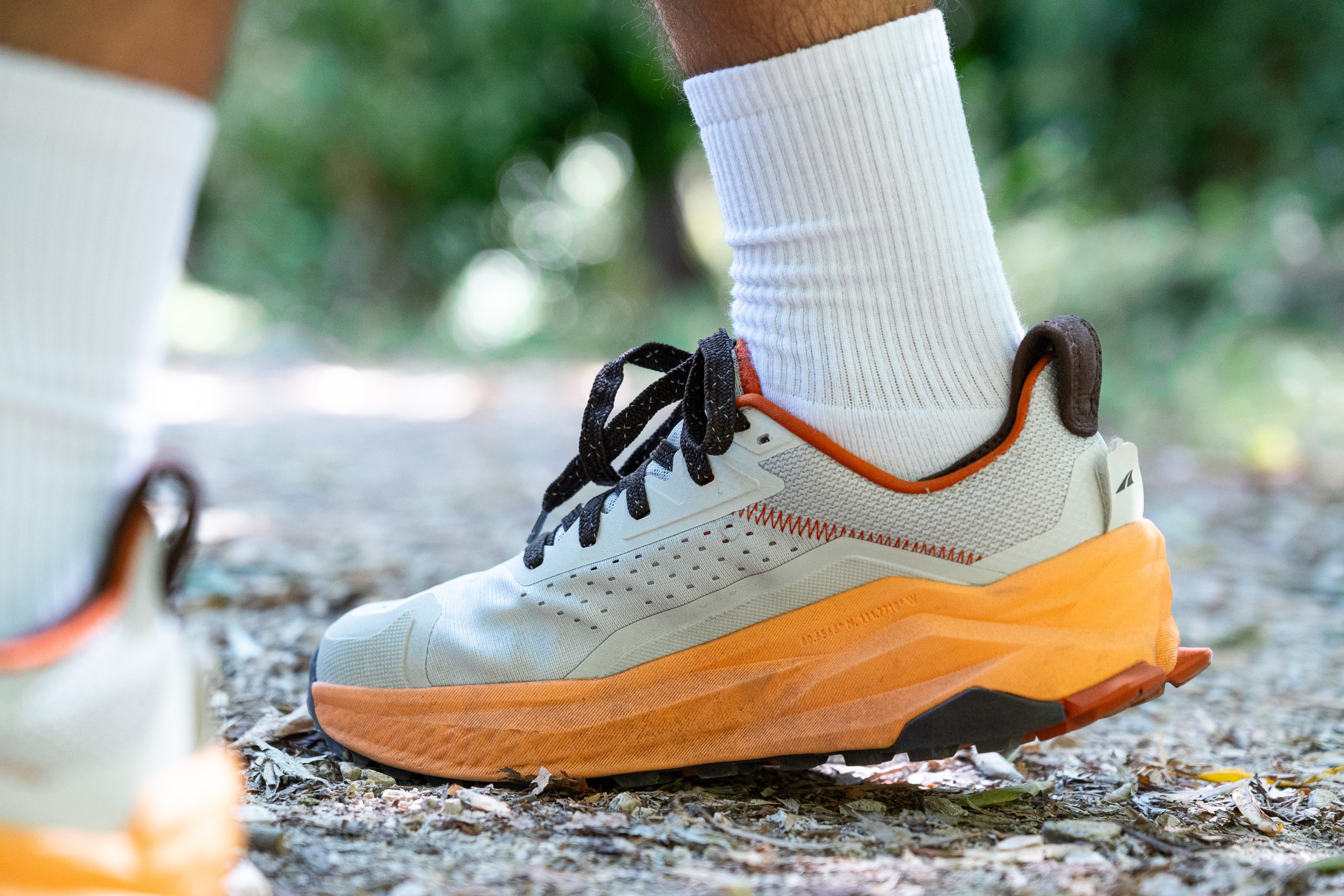
This finding also confirms that despite the launch of their new 4 mm Experience line, Altra's core focus remains on its zero-drop running shoes.
It's also important to note that zero-drop geometry typically favors forefoot and midfoot strikers and may not suit everyone. If you're accustomed to shoes with higher drops, transitioning to zero-drop should be gradual to avoid discomfort.
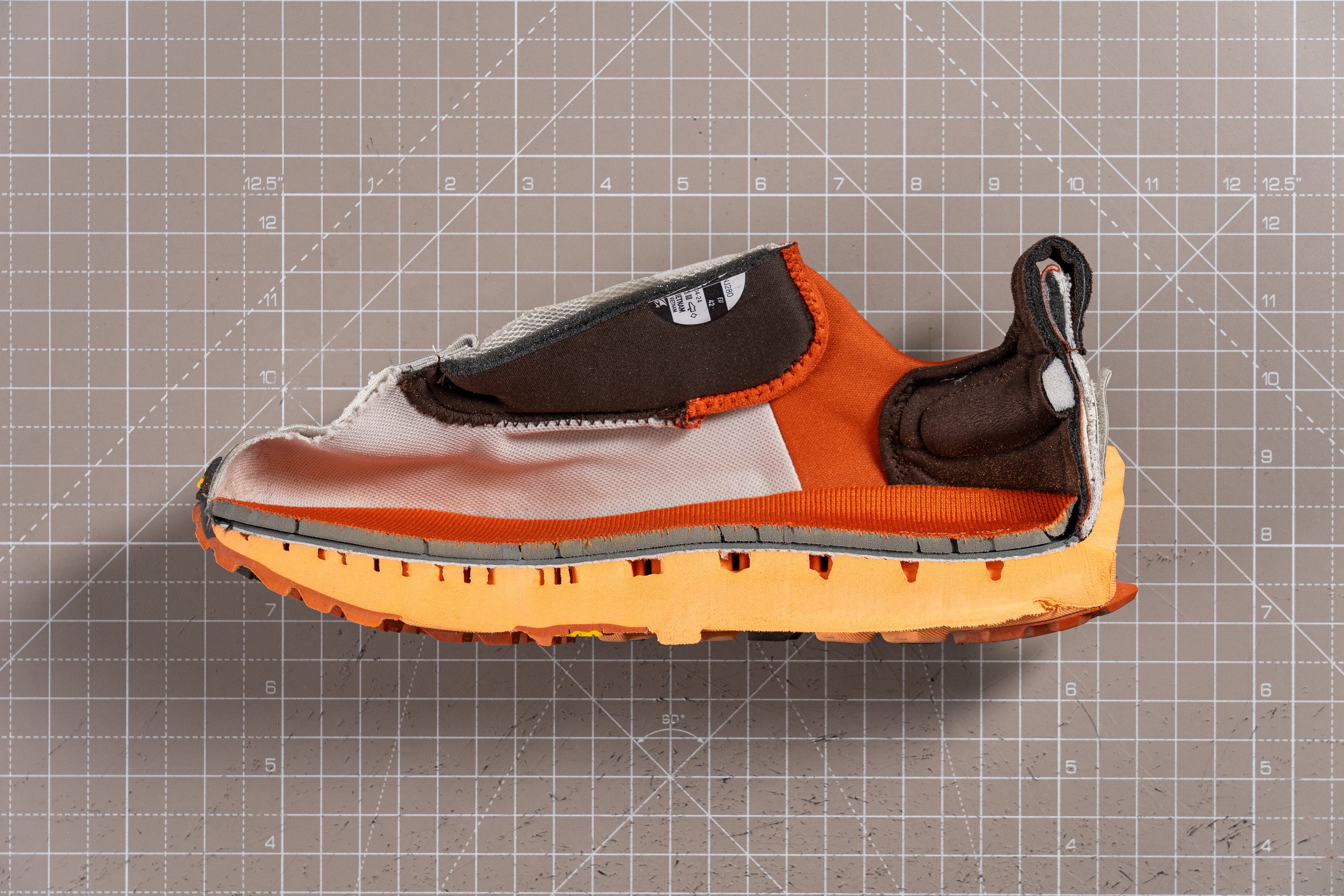
| Olympus 6 | 0.7 mm |
| Average | 7.6 mm |
Midsole softness
UpdatedBesides weight, here's our second main complaint about the Altra Olympus 6—the midsole. Although it feels comfortable underfoot with moderate softness at 38.3 AC, we believe that a shoe priced near $200 should feature something more advanced than standard CMEVA foam.
EVA foams are common in many running shoes, but since 2017, more resilient materials like Pebax or TPEE have emerged. Even supercritical EVAs, which are lighter and bouncier due to their airier formulation, offer significant advantages over traditional EVA foams like the one used here.
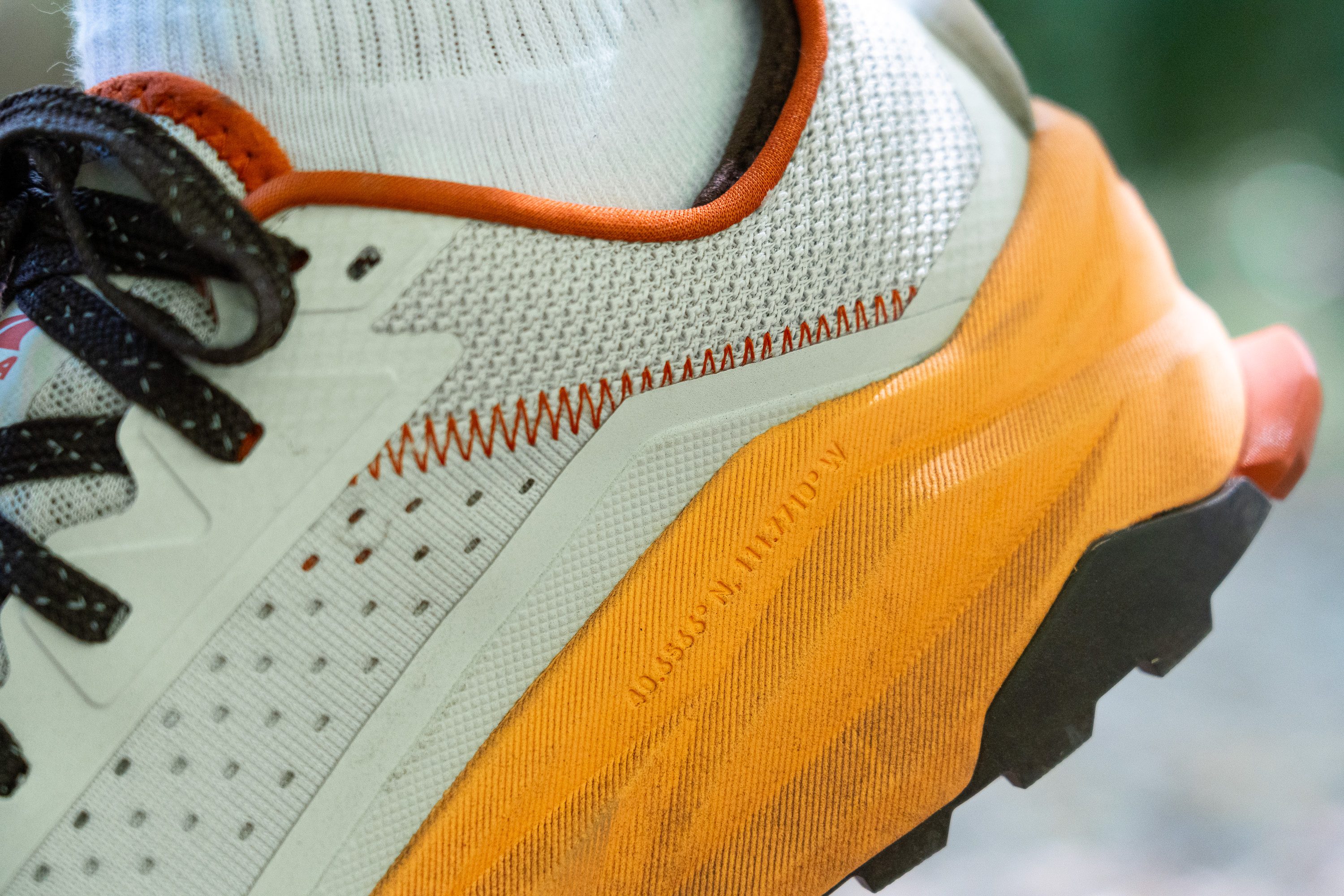
So, as it stands, the Olympus 6 still sports a typical EVA midsole, not even the basic EGO foam used in some mid-tier road shoes like the Provision 8. And Ego Pro or Ego Max? Of course not, but in our opinion, an Olympus with EGO Max foam would not only make sense based on the performance and price of the VIA Olympus 2, but it's also what this shoe truly deserves.
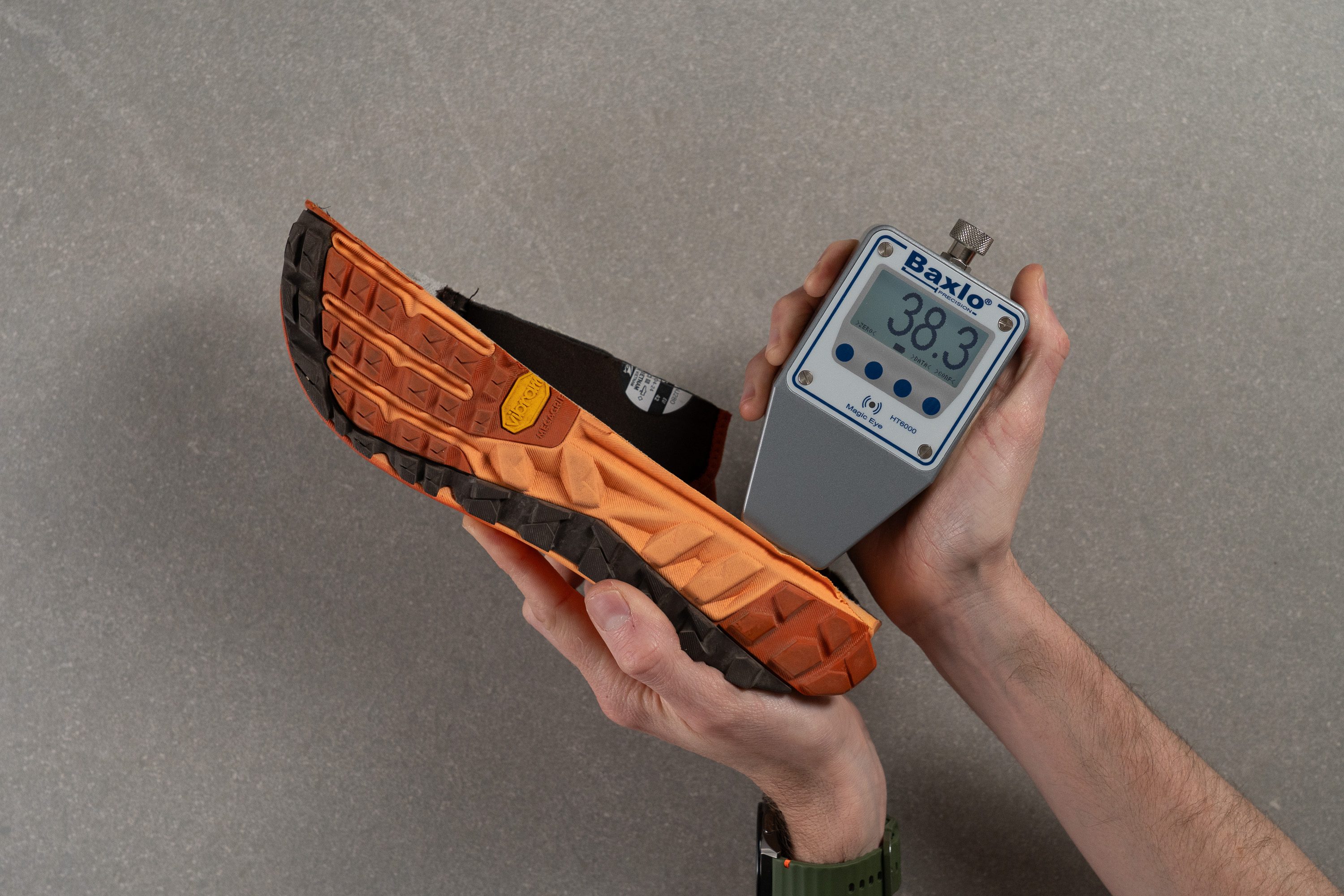
| Olympus 6 | 38.3 AC |
| Average | 37.5 AC |
Rocker
We discovered that the Olympus 6 retains the classic Altra DNA with a subtly late toe rocker that isn’t very pronounced, enhancing natural running and improving its suitability for walking—a beneficial feature for a shoe that often doubles for hiking purposes. So, definitely good news here.
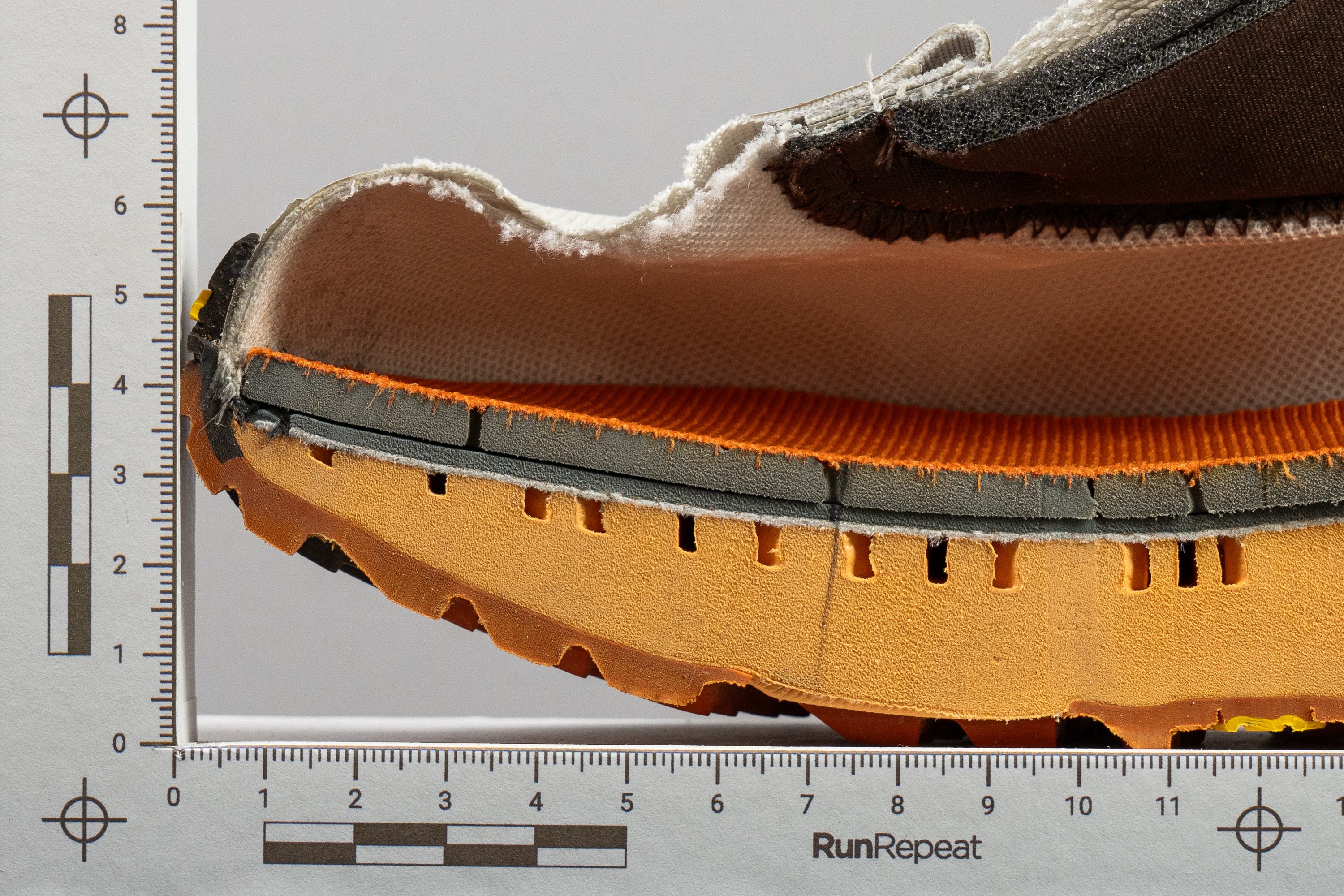
Size and fit
Size
Altra Olympus 6 fits slightly small (61 votes).
Width / Fit
All Altra shoes have two major selling points—the low-drop geometry and the foot-shaped, accommodating fit with excellent step-in comfort. The Olympus 6 is built using Altra's Original FootShape Fit, the widest of their three shapes—Standard and Slim being the other two.
We measured 97.5 mm at the widest part, already wider than average, though nothing extraordinary yet. However, the real magic happens in our the toebox, where we observed the true benefit of this foot-shaped design.
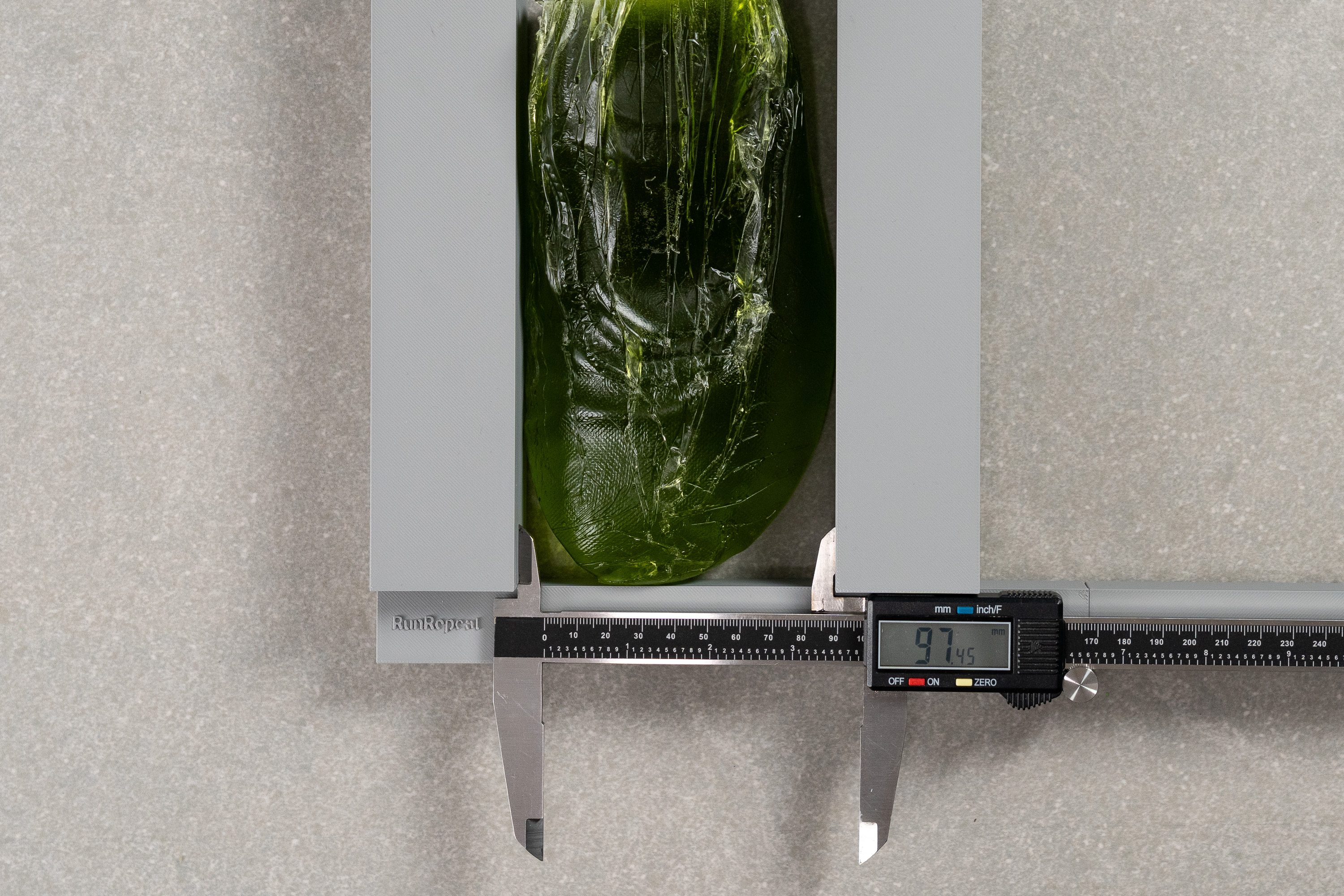
| Olympus 6 | 97.5 mm |
| Average | 95.6 mm |
Toebox width
At 81.1 mm in the big toe area, it's significantly wider than regular shoes, offering exceptional room for toe splay, a huge advantage on long trail adventures.
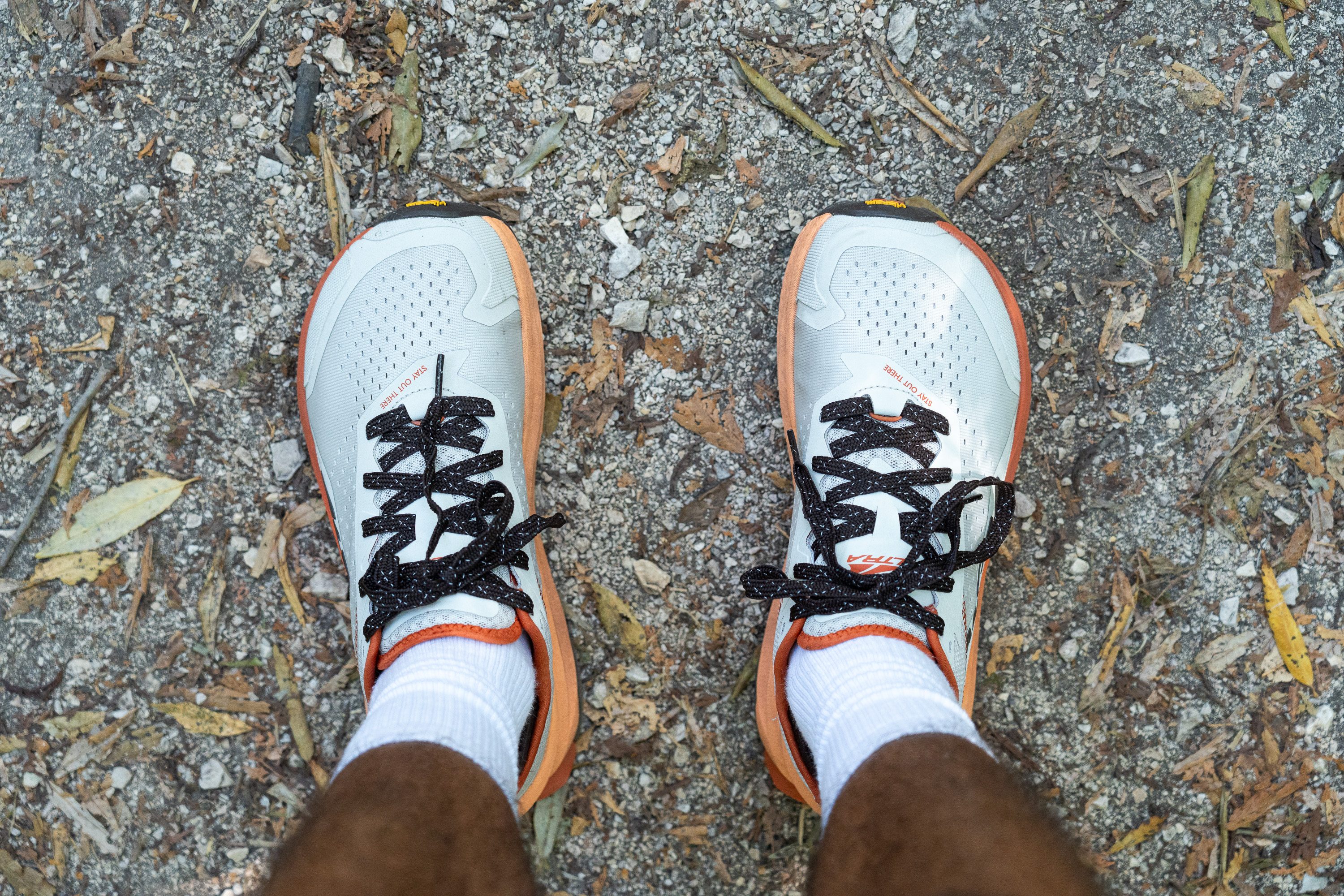
This feature is perfect for those with square-shaped feet, and for individuals who naturally spread their toes while walking or running. We found it incredibly comfortable, and while the shoe may look a bit weird at first if you're not into Altra's world, the spaciousness and comfort are unmatched.
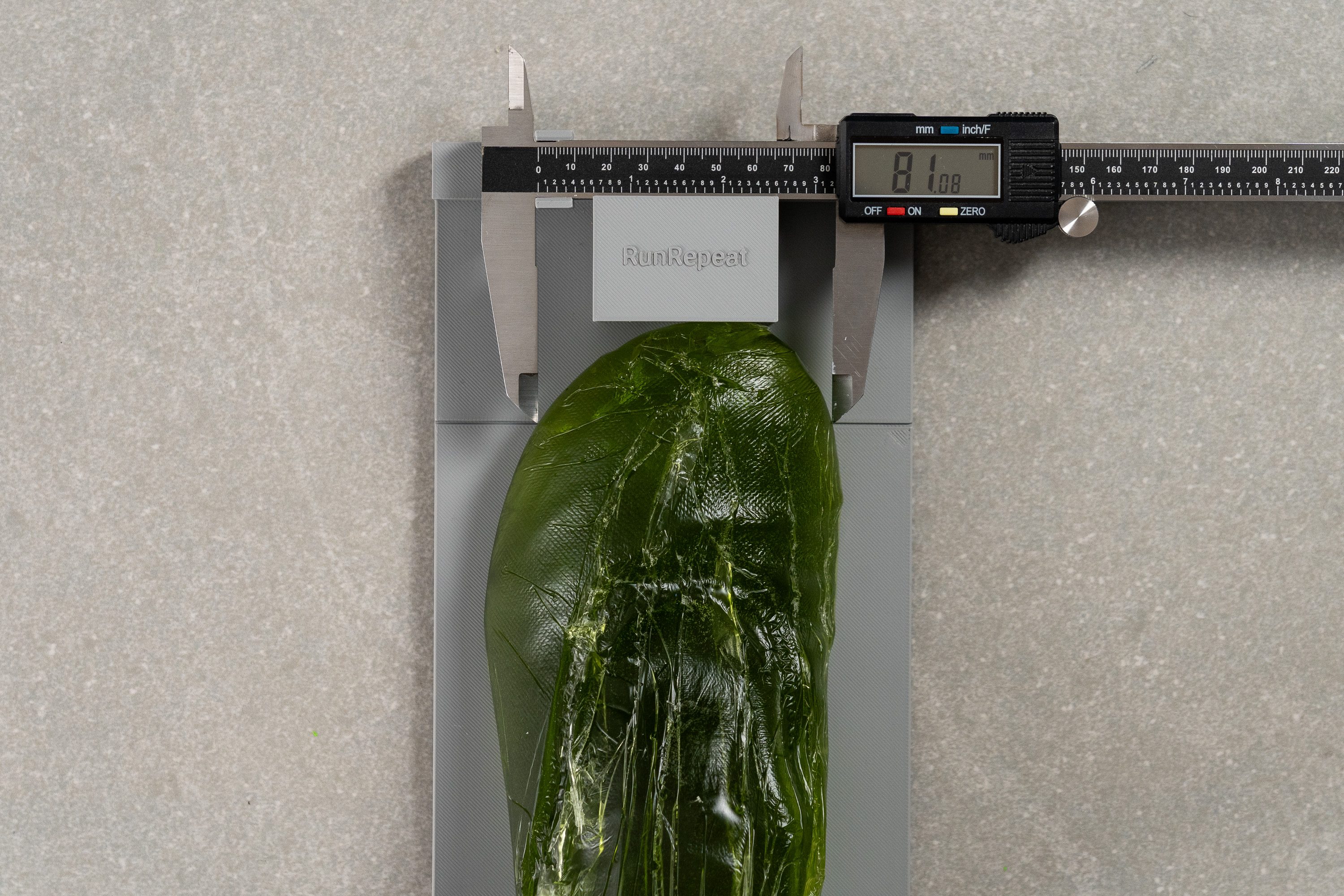
| Olympus 6 | 81.1 mm |
| Average | 74.6 mm |
Toebox height
This upper is undeniably high-volume, with vertical room well above average at 28.7 mm—plenty of freedom for your toes!
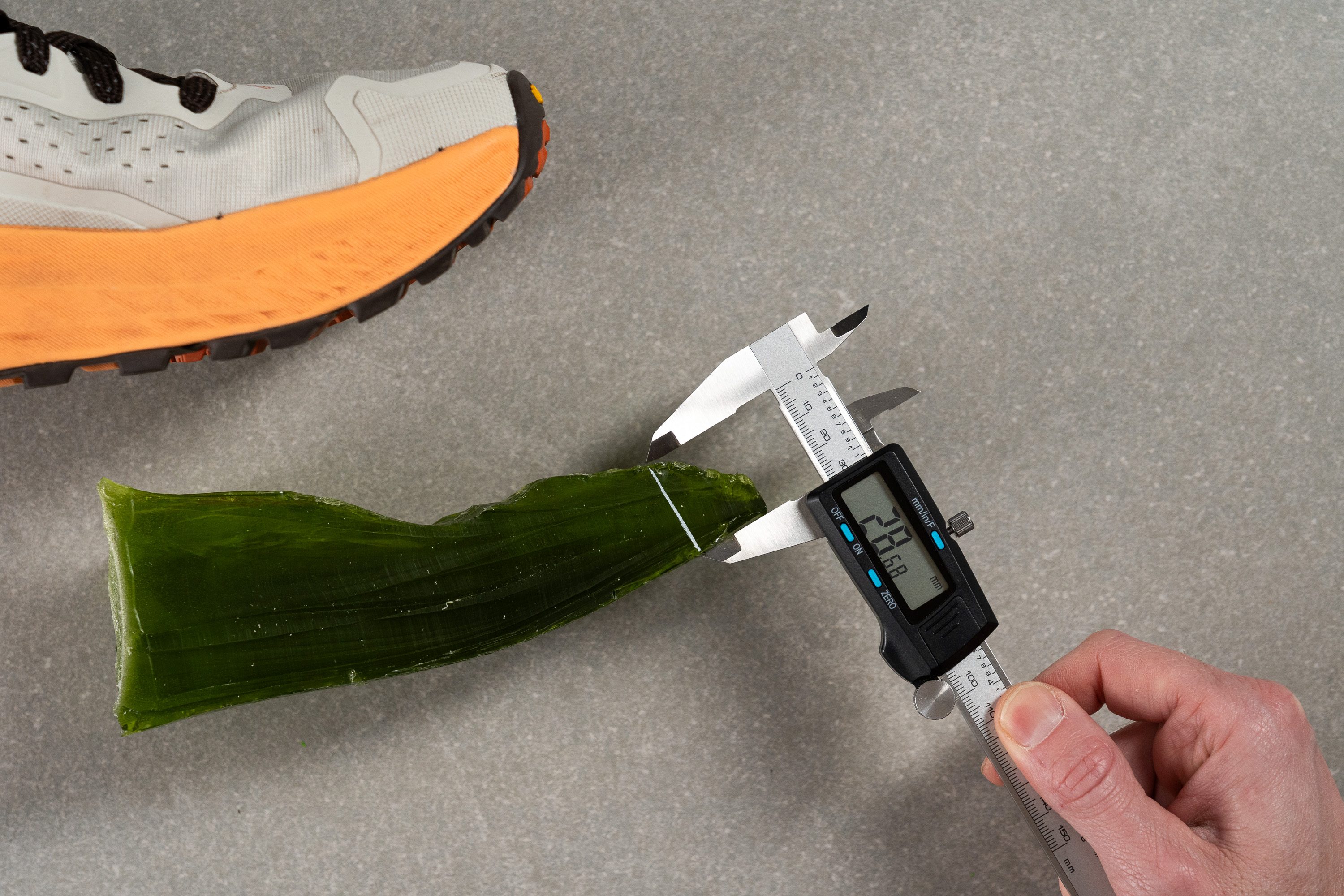
| Olympus 6 | 28.7 mm |
| Average | 27.0 mm |
Traction / Grip
Forefoot traction
| Olympus 6 | |
| Average | 0.61 |
Lug depth
Lugs are crucial for any trail shoe, providing the necessary grip for rugged terrains. We were pleased to discover that Altra has made some subtle yet effective tweaks to the lugs on the Olympus 6.
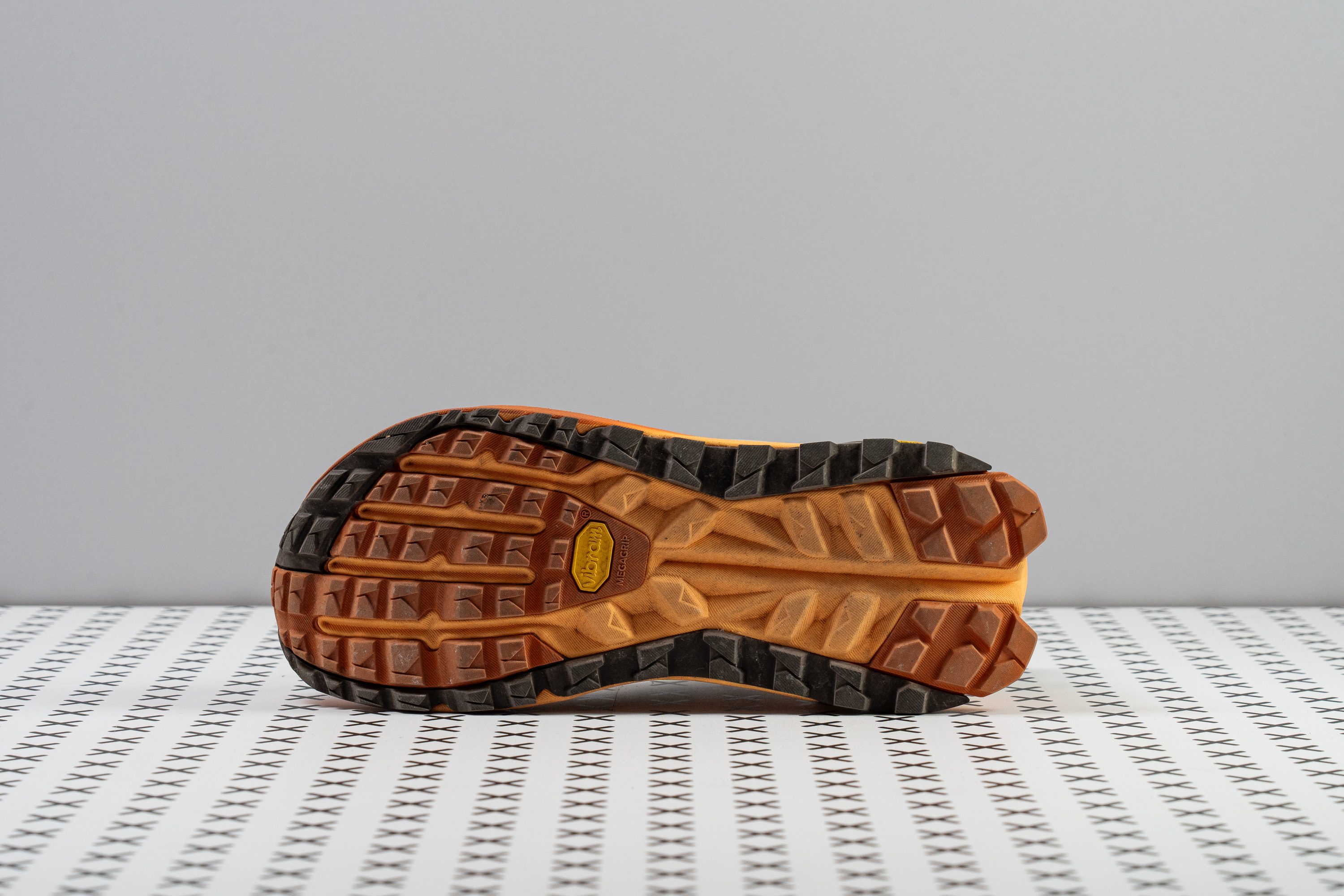
Now measuring 3.5 mm deep—up from 3.0 mm—these lugs may look similar but have been clearly redesigned based on feedback from the previous model.
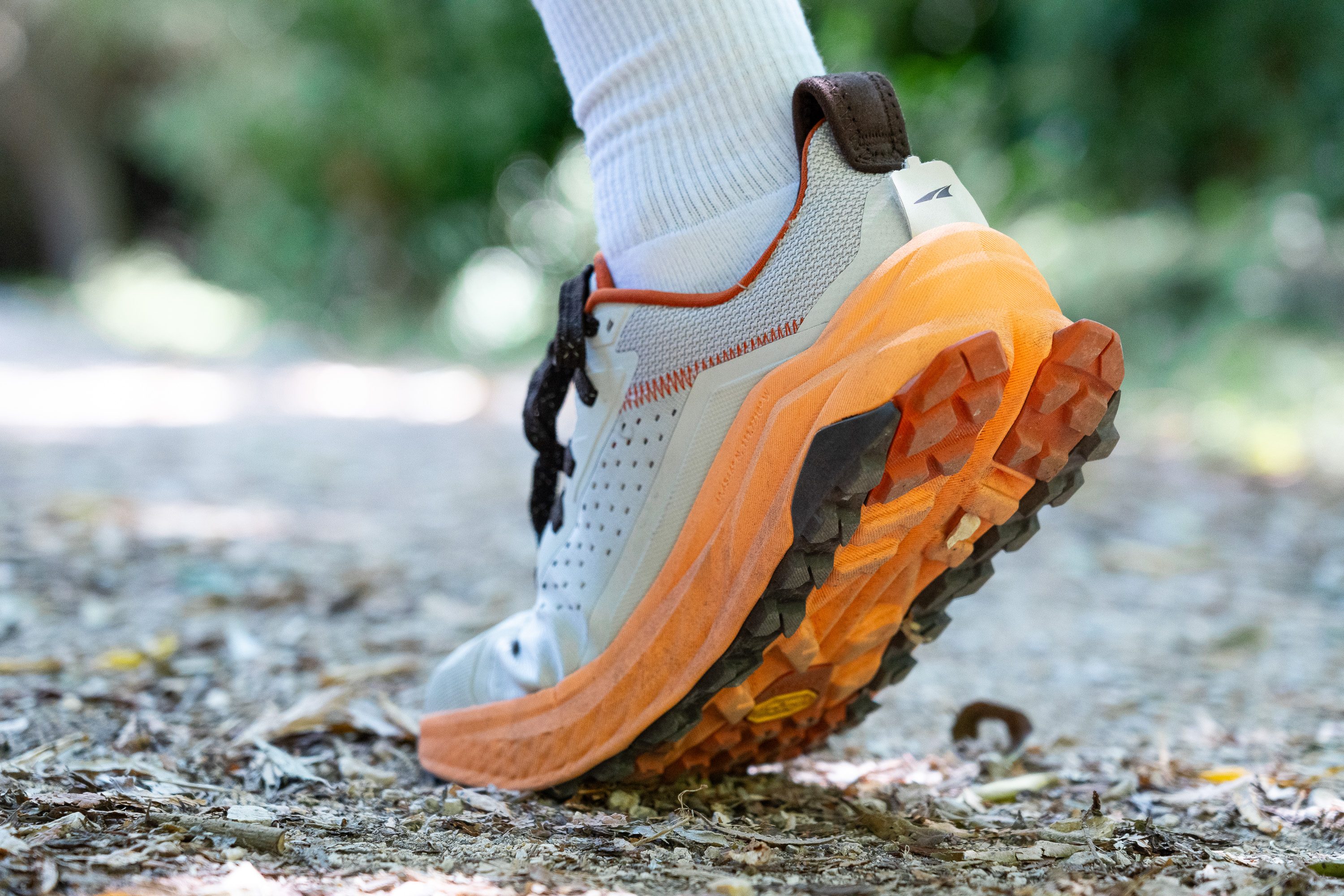
The midfoot lugs are notably larger, and the tread has improved significantly in the forefoot for better grip on uphill climbs. Overall, this update is a strong improvement, and we appreciate that Altra has maintained a moderate lug depth, avoiding the less versatile and clunky 5.0-mm lugs.
| Olympus 6 | 3.5 mm |
| Average | 3.5 mm |
Outsole design
The outsole uses full-length Vibram Megagrip rubber in a two-tone black-and-orange layout. Both heel and forefoot feature segmented zones for added flexibility, while the midfoot includes a large cutout that reduces weight. True to Altra’s signature approach, the lug pattern mirrors the foot’s natural shape, offering an anatomy-inspired structure.
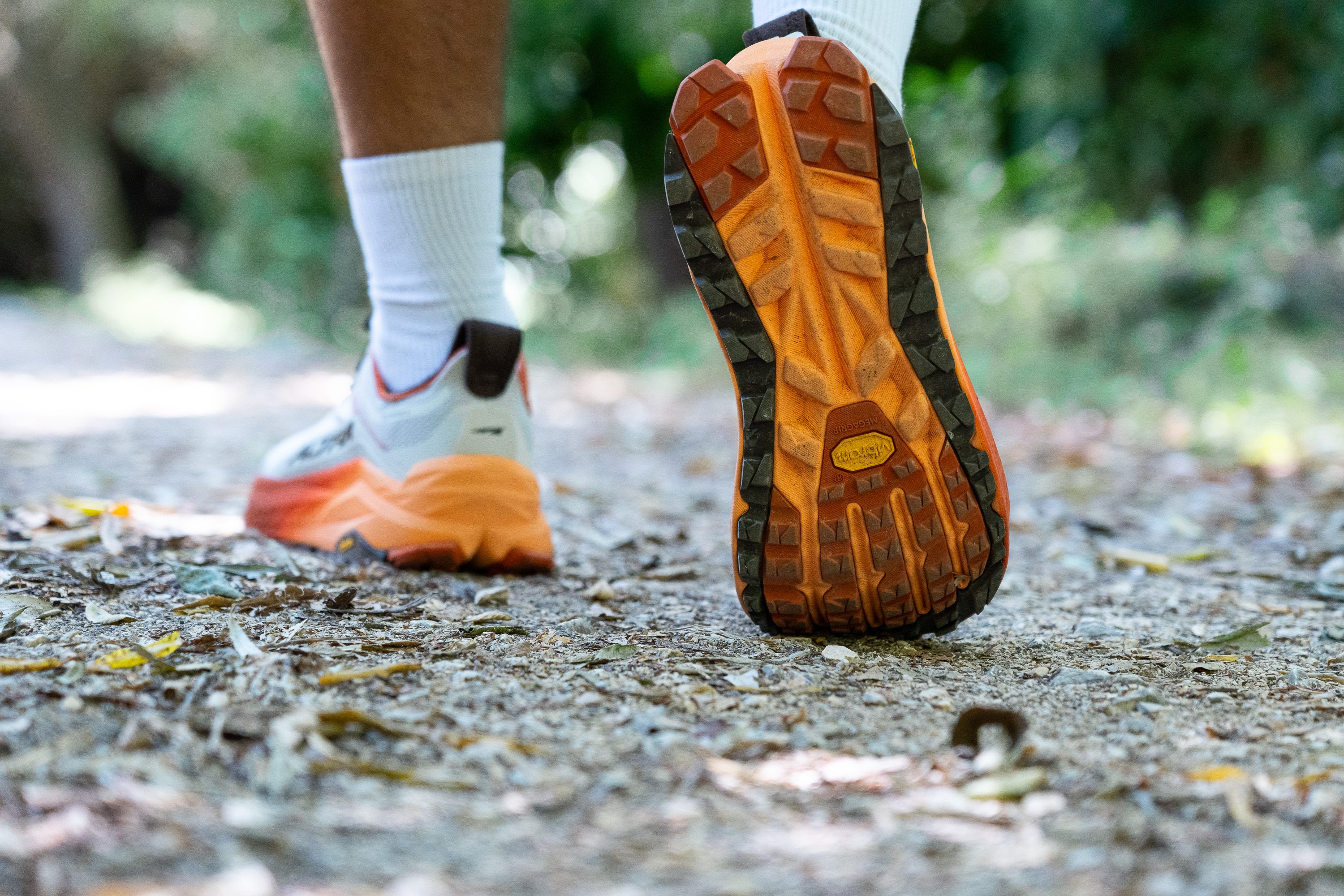
Flexibility / Stiffness
A large stack height paired with a Vibram Megagrip rugged outsole usually results in a stiff shoe. However, Altra has incorporated strategic grooves in the outsole to enhance flexibility, and with a flexibility rating of 17.5N from our 30-degree lab test, the Olympus 6 more or less delivers. It’s not ultra-flexible, but for its massive build, it’s not bad.
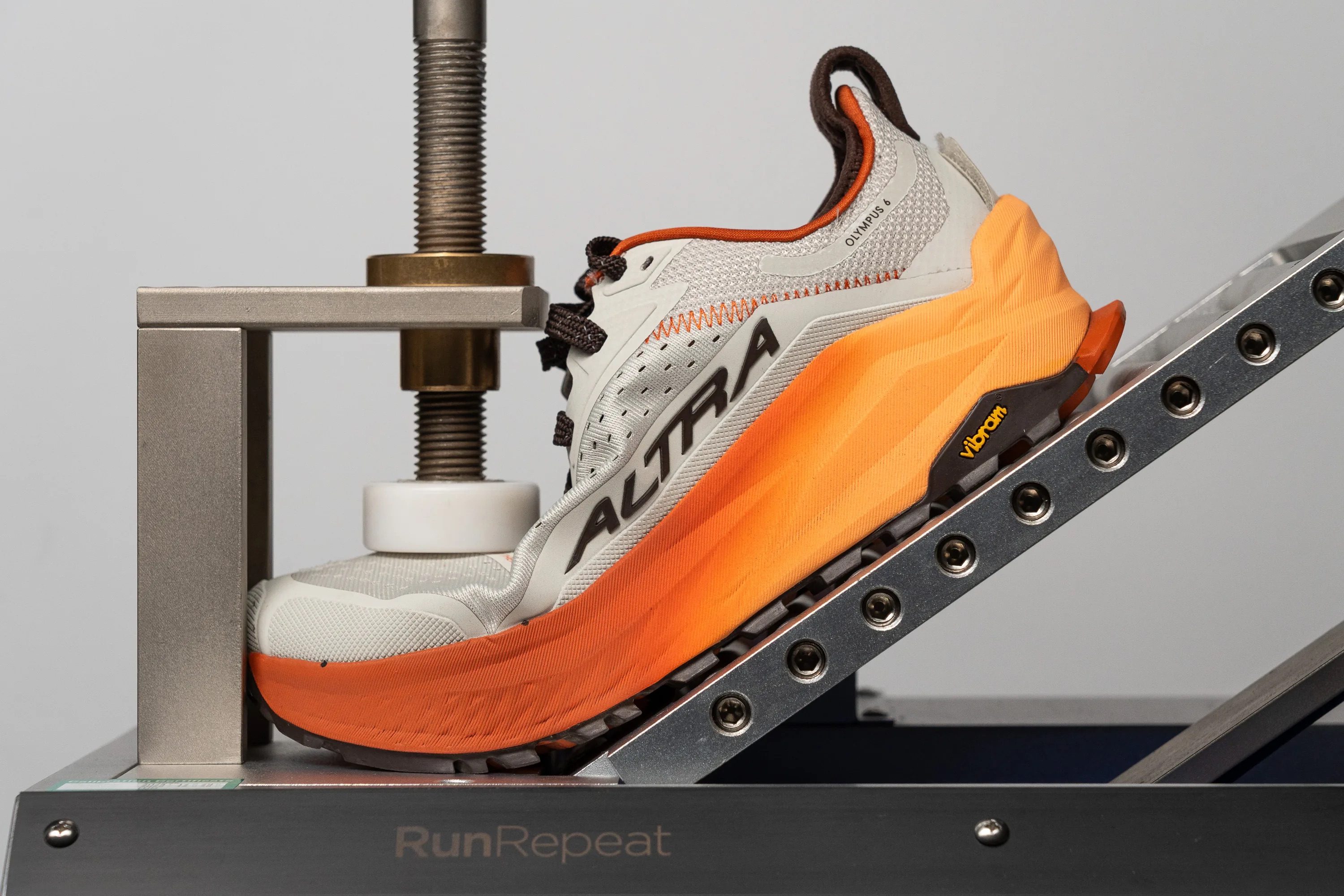
| Olympus 6 | 17.5N |
| Average | 14.6N |
Weight
At 11.46 oz or 325g, the Olympus 5 was already a heavyweight trail shoe—though somewhat reasonable given its size. Yet many of us truly hoped for at least a minor weight reduction in this update, but unfortunately, that hasn't happened.
In fact, we've found the opposite. The Olympus 6 weighs in at 12.6 oz or 357g, making it more than an ounce heavier than its predecessor. Although we recognize the impossible challenge of crafting a lightweight, tank-like shoe, the substantial increase in weight is impossible to ignore.
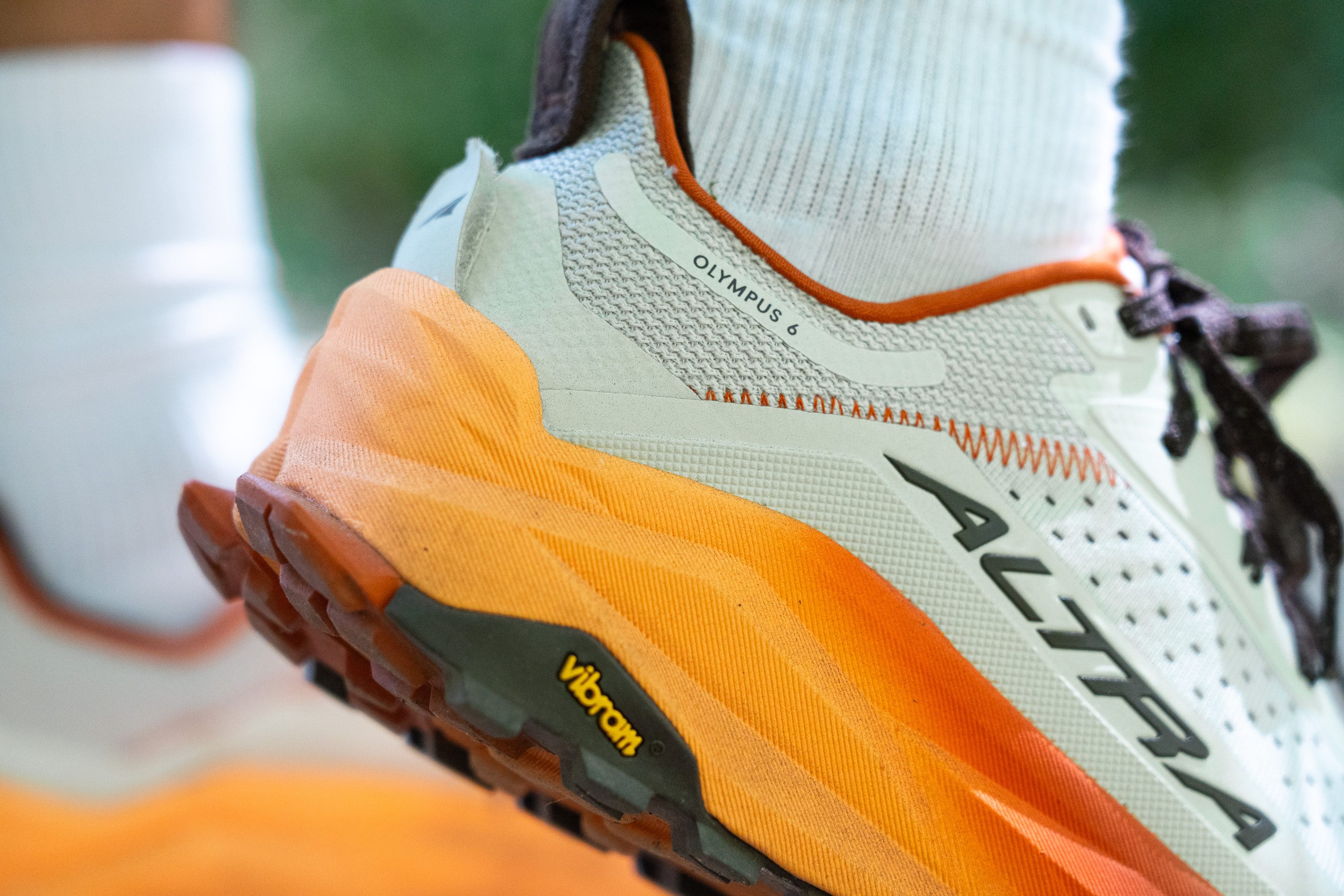
Ultimately, we believe that seems Altra isn’t concerned about the added heft in the Olympus 6, assuming their loyal fanbase will tolerate the heavy feel underfoot in exchange for a ultra-rugged shoe capable of handling any adventure across any terrain.
| Olympus 6 | 12.6 oz (357g) |
| Average | 10.2 oz (289g) |
Breathability
One of our major concerns with the Olympus 5 was breathability—we gave it a 3 out of 5. Truth is, trail shoes often struggle to balance durability and ventilation, but we’re pleased to say Altra has nailed it with the Olympus 6 this time.
We tested this using our machine to push smoke inside the shoe and immediately saw Altra’s improvements. After two years in the making, the Olympus 6 earned a well-deserved 5/5 for breathability.
Using our light, we found how they did it. Altra strategically combined thin areas filled with ventilation holes and denser sections that add structure where it’s needed most. We’ll still need to see how this holds up in our toebox durability test, but so far, it’s impressive.
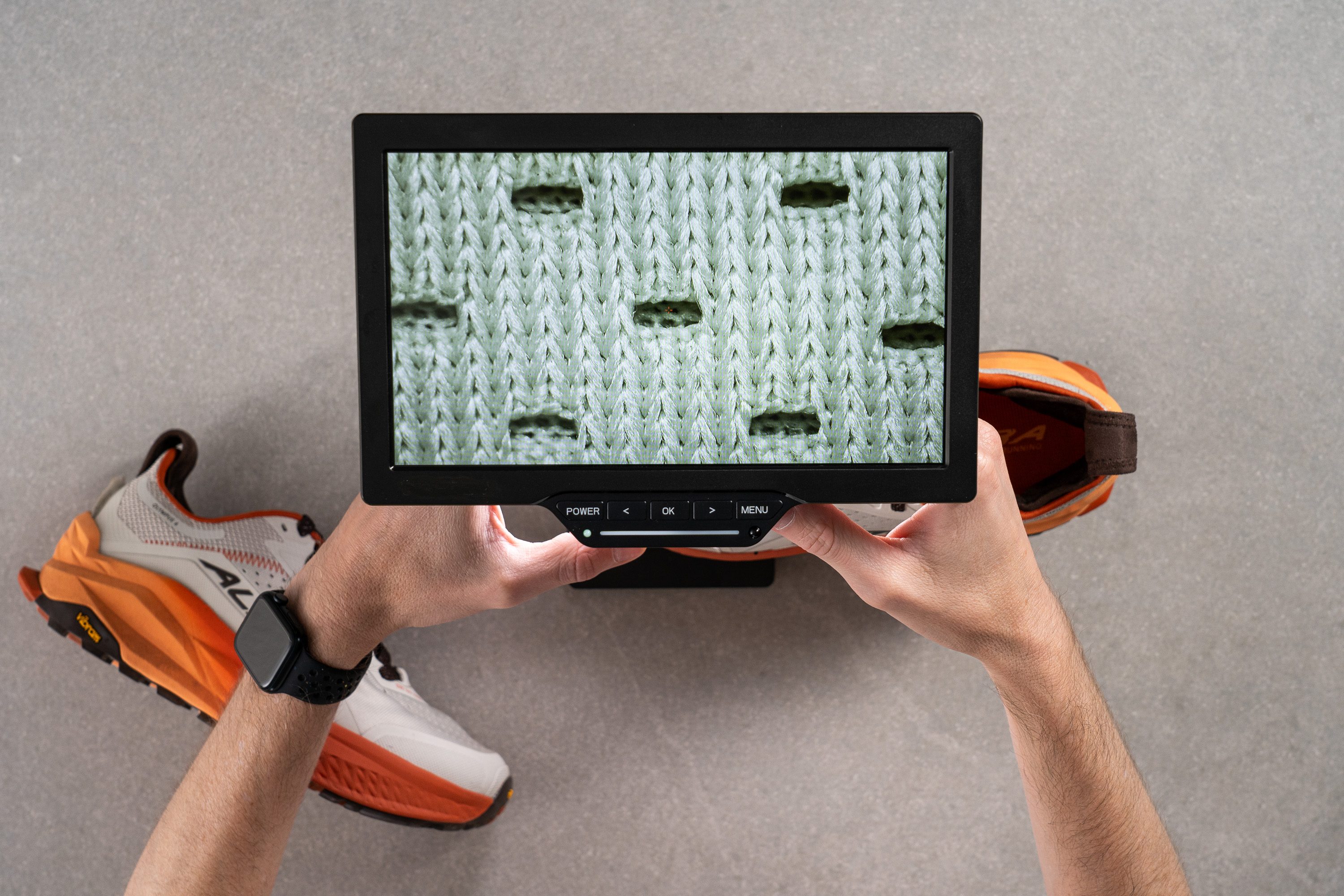
We also examined the upper under a microscope and confirmed our initial observations—the large ventilation holes are primarily responsible for the excellent airflow. However, the real secret lies in the secondary layer beneath the main one, which is also perforated, a crucial detail!
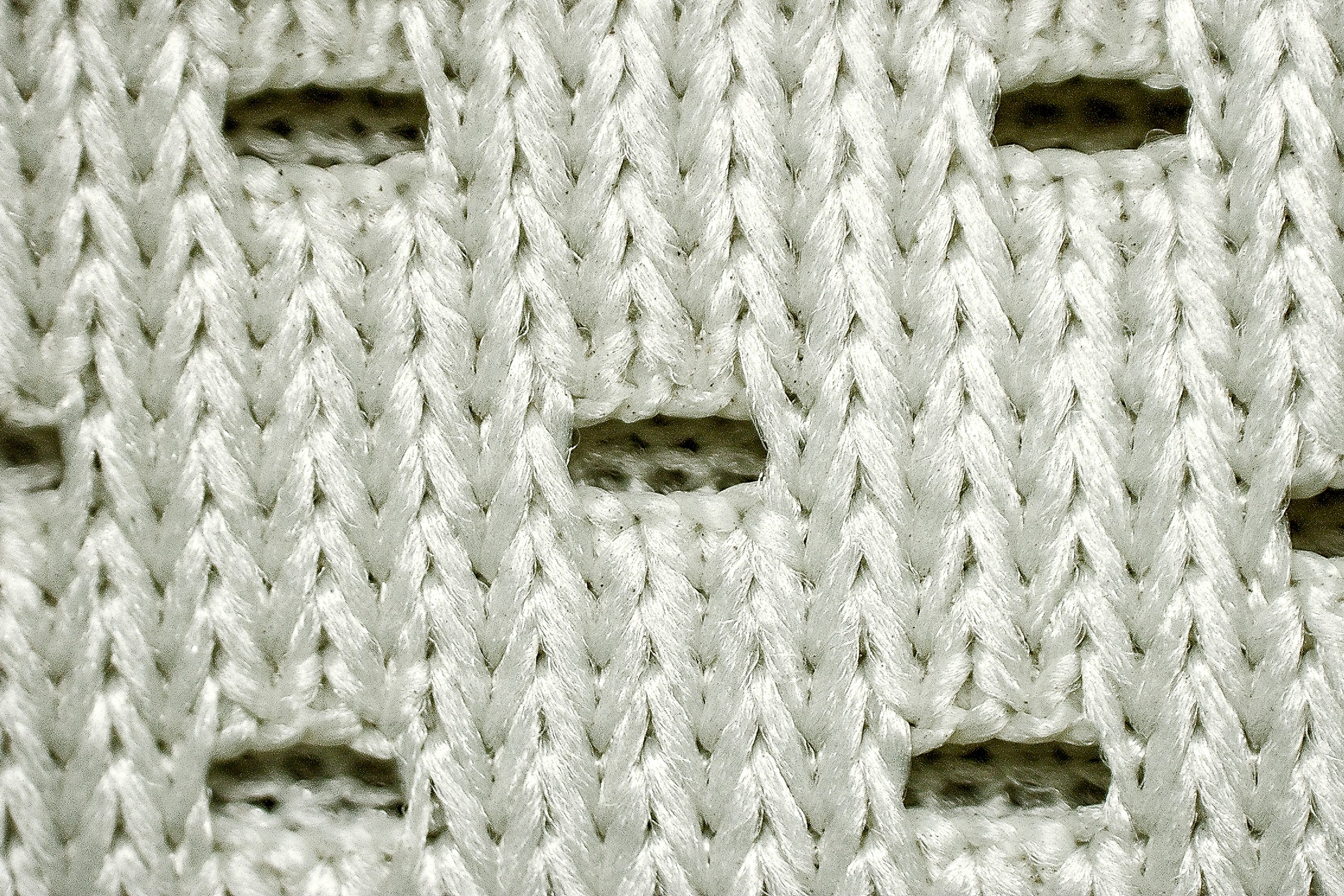
By hand, we carefully examined each part of the upper, and we must say it’s one of the most advanced we’ve tested.
It’s filled with thoughtful design touches, such as the double padding in the heel that extends to the calcaneus and the small but efficient ventilation holes in the midfoot.
| Olympus 6 | 5 |
| Average | 3.3 |
Stability
Lateral stability test
From the moment we unboxed the Olympus 6 in our lab, it was clear that this shoe was designed for superior stability. The noticeably high midsole sidewalls, combined with SUV-like dimensions and the zero-drop geometry, all hinted at its robust support.
Given these features, we believe the Olympus 6 is well-suited for runners with mild pronation issues. Additionally, neutral runners can expect a really stable ride, even with the high stack height.
Torsional rigidity
Altra has stiffened the Olympus 6 compared to its predecessor, upgrading from a 3/5 to a 4/5 rating. This improvement, though subtle, is quite noticeable—it was remarkably challenging for us to bend the shoe, even without any kind of reinforcing plate, not even an anti-rock one.
| Olympus 6 | 4 |
| Average | 3.6 |
Heel counter stiffness
The heel counter of the Olympus 6 maintains a balanced 3/5 rating, similar to what you'd expect in most daily running shoes.
We appreciate this intentional design choice in a shoe that aims to provide sufficient heel support without overdoing it, especially since, as we've noted before, zero-drop shoes are designed to encourage striking with the midfoot or forefoot.
| Olympus 6 | 3 |
| Average | 3 |
Midsole width - forefoot
We initially thought the forefoot would measure wider than the 114.9 mm we registered, perhaps an optical illusion caused by the foot-shaped toebox we'll explore shortly. Nevertheless, this width shouldn’t pose a problem on most trails and even contributes some agility to what otherwise feels like a clunky shoe.
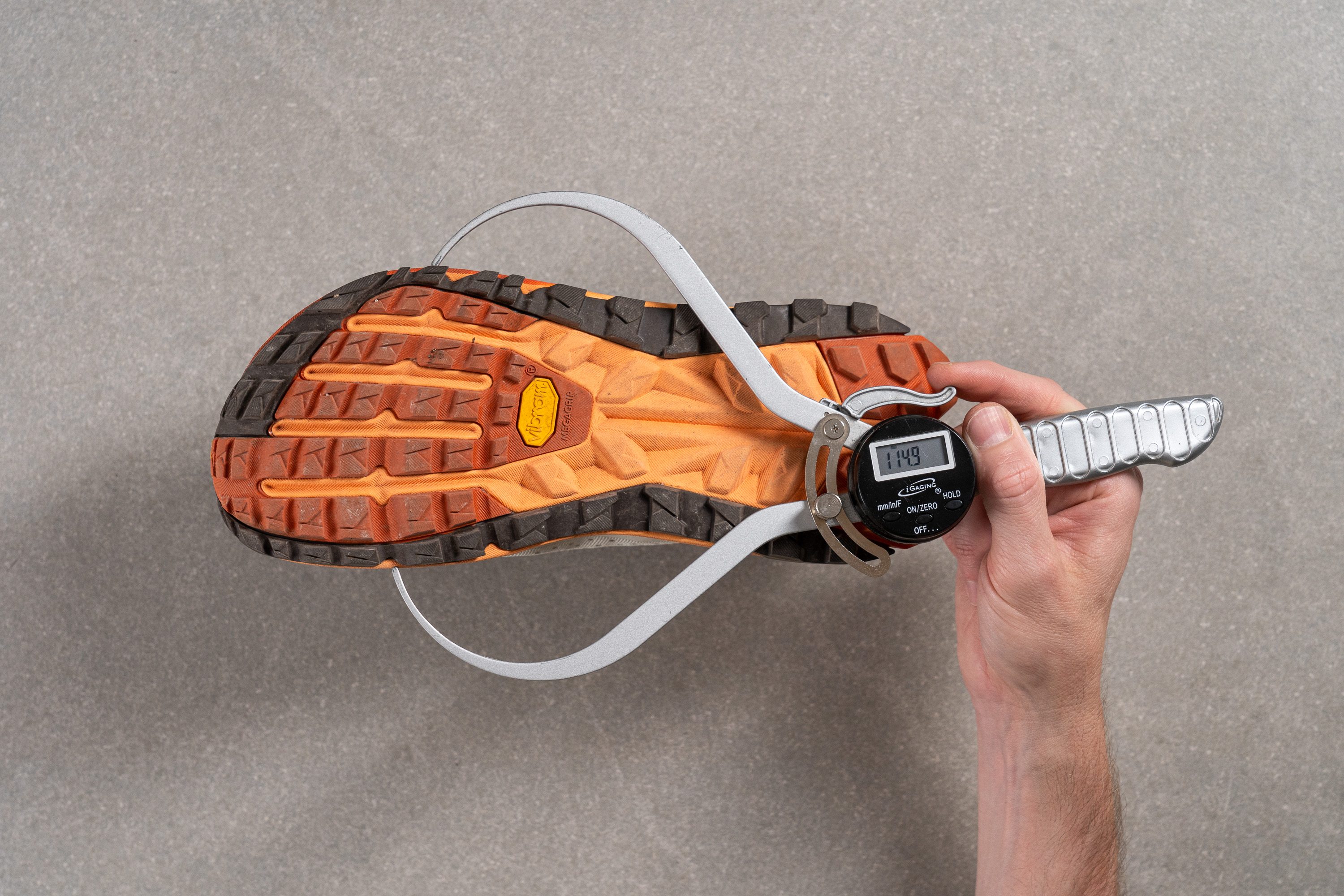
| Olympus 6 | 114.9 mm |
| Average | 112.8 mm |
Midsole width - heel
Descending to the heel, the midsole of the Olympus 6 is significantly wider than what we typically see in our lab regarding trail shoes, measuring 101.4 mm.
Remember that even forefoot or midfoot strikers might find themselves heel striking on certain terrains, like some downhill sections. With such a towering stack height, this added width is essential.
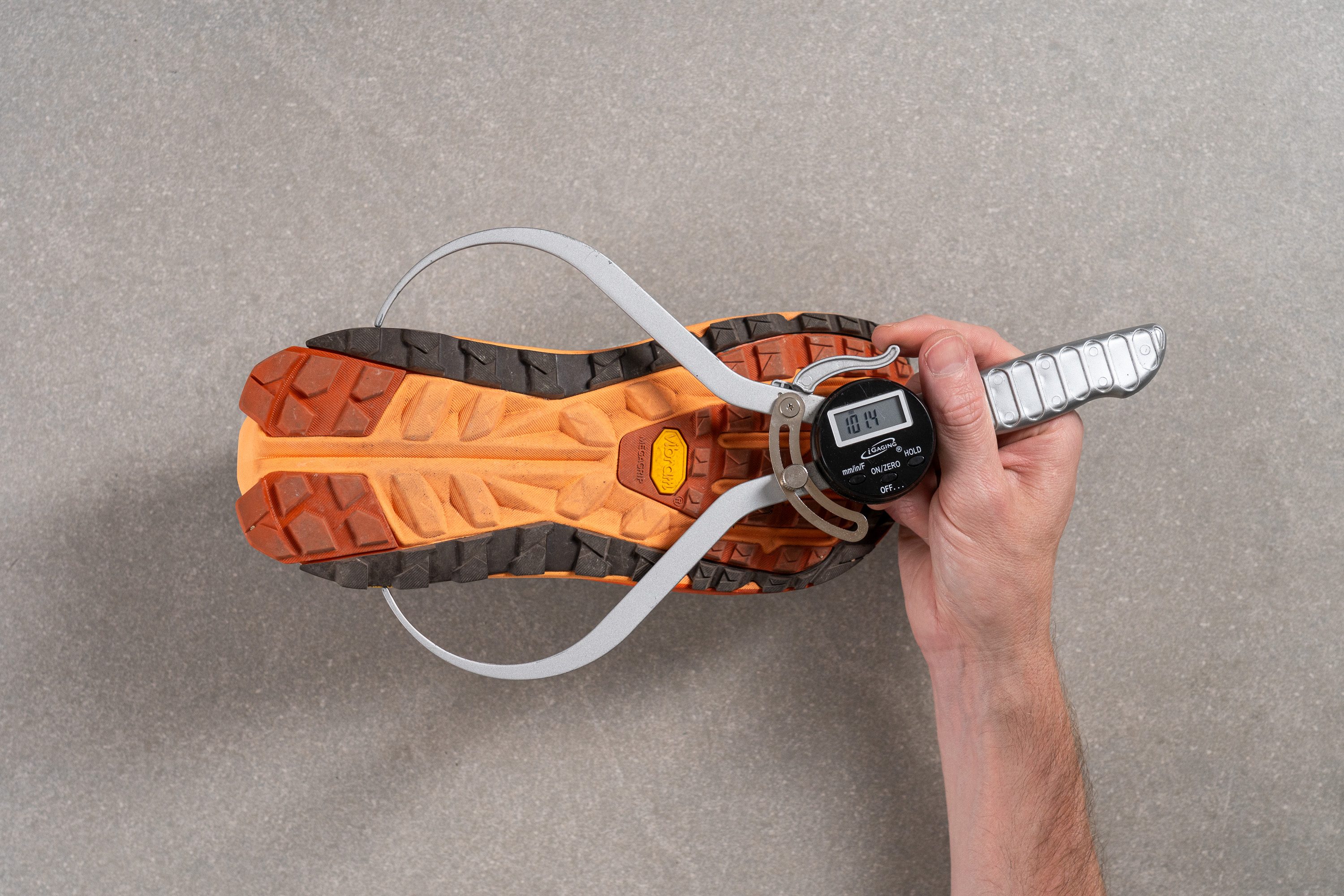
| Olympus 6 | 101.4 mm |
| Average | 89.9 mm |
Durability
Toebox durability
We've already confirmed that the upper is absolutely world-class in terms of ventilation. Now, we've went for a tougher challenge, key for all trail running shoes, as they typically endure constant impacts and abrasions from rocks, branches, and other environmental hazards.
We tested the softest part of the upper—away from the rugged TPU reinforcements—using our Dremel, and despite that, we discovered an excellent result, awarding it our top 5/5 rating for durability. Earning top marks for both durability and breathability in the lab is an exceptionally rare achievement!
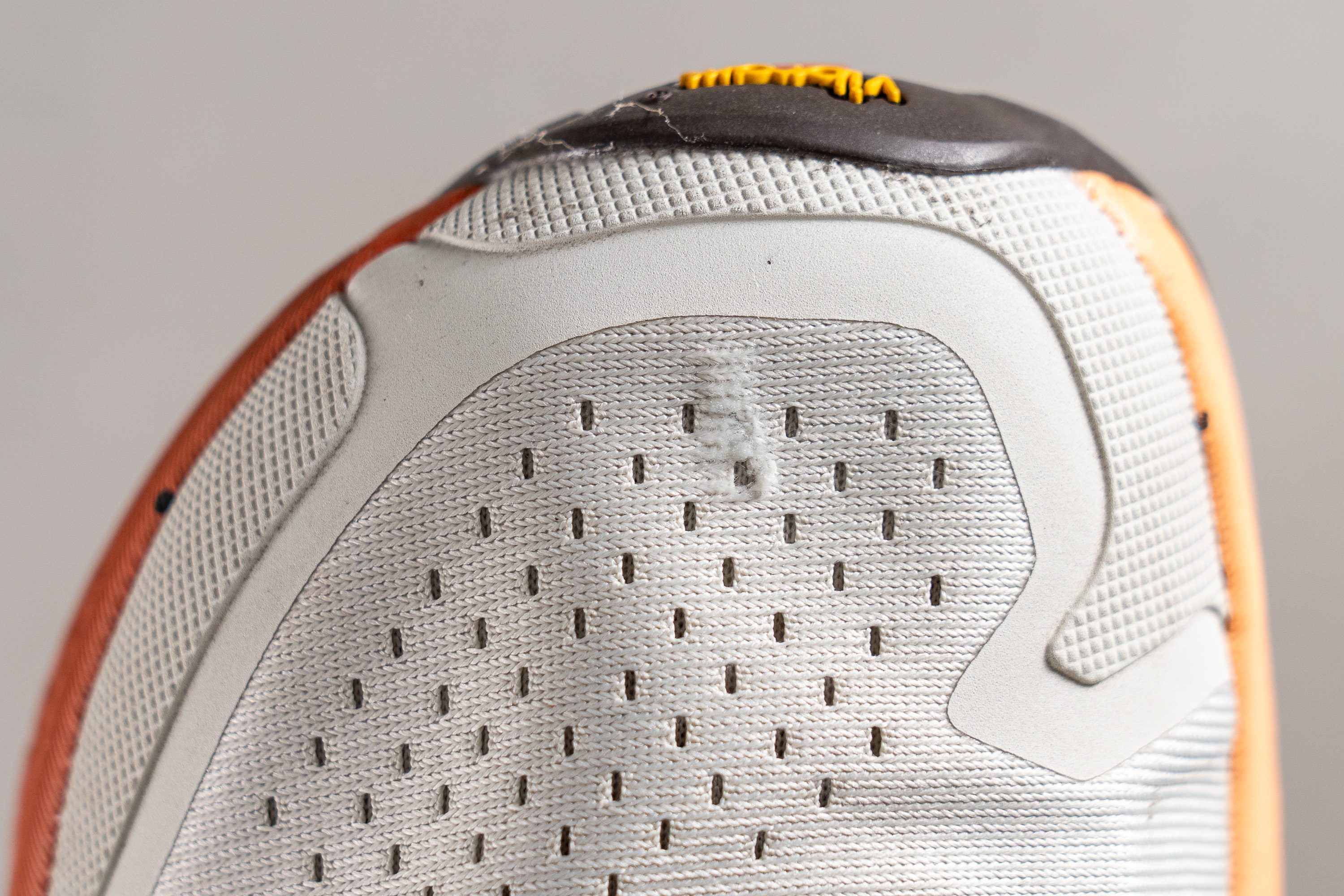
| Olympus 6 | 5 |
| Average | 3.1 |
Heel padding durability
We were still impressed by the results of the two previous tests, and naturally, we had high hopes for the heel counter to continue this strong performance.
Although the Olympus 6 didn’t quite achieve another 5, it performed admirably, securing a solid 4/5. This score effectively removes any concerns about the heel rubbing against the Achilles or showing early wear—those issues are extremely unlikely to happen in this shoe.
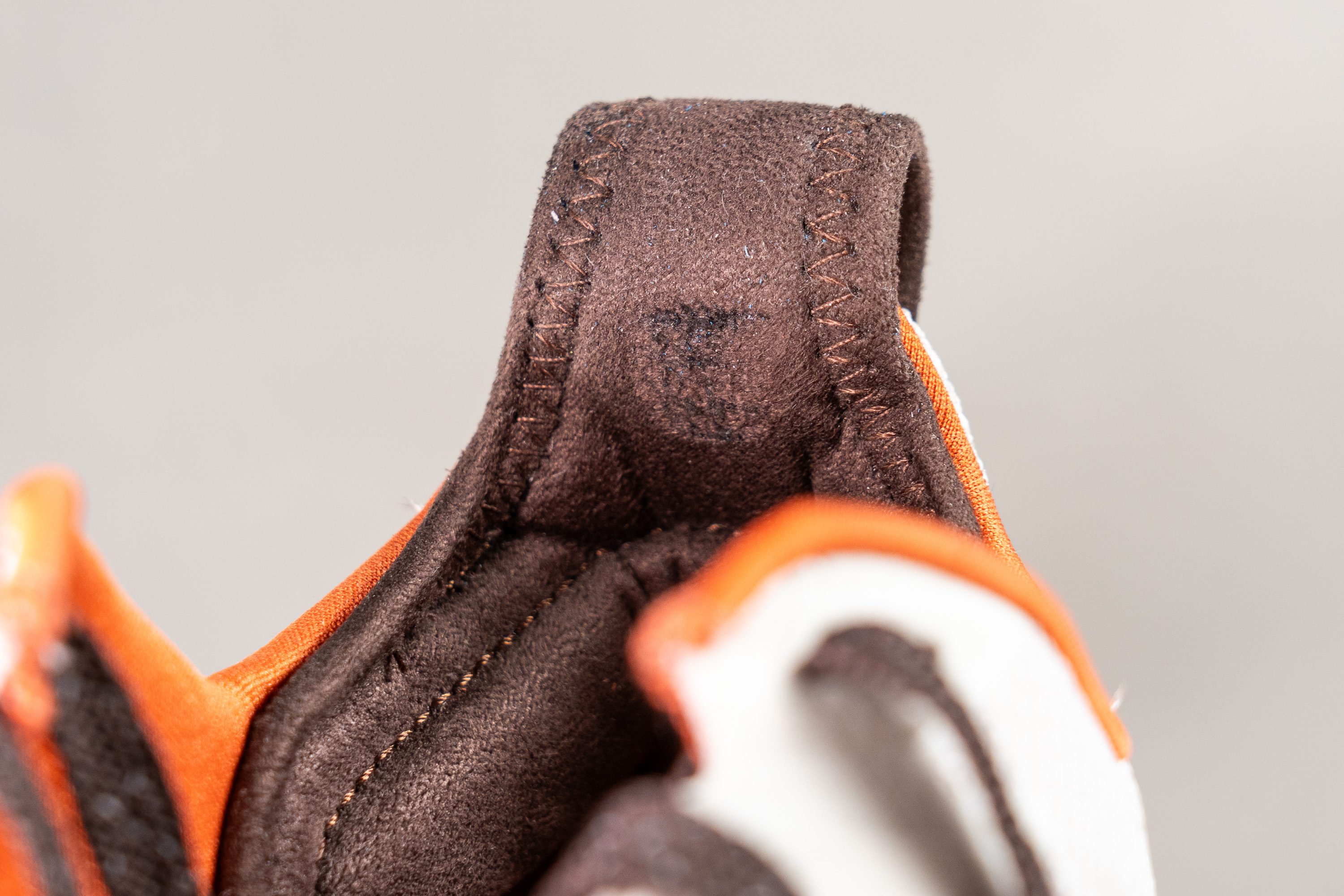
| Olympus 6 | 4 |
| Average | 3 |
Outsole hardness
The expectations are incredibly high for the outsole after the upper earned a summa cum laude from us. And hey, our first impressions are positive, especially since the Olympus 6 features what we consider the gold standard of outsoles—Vibram Megagrip.
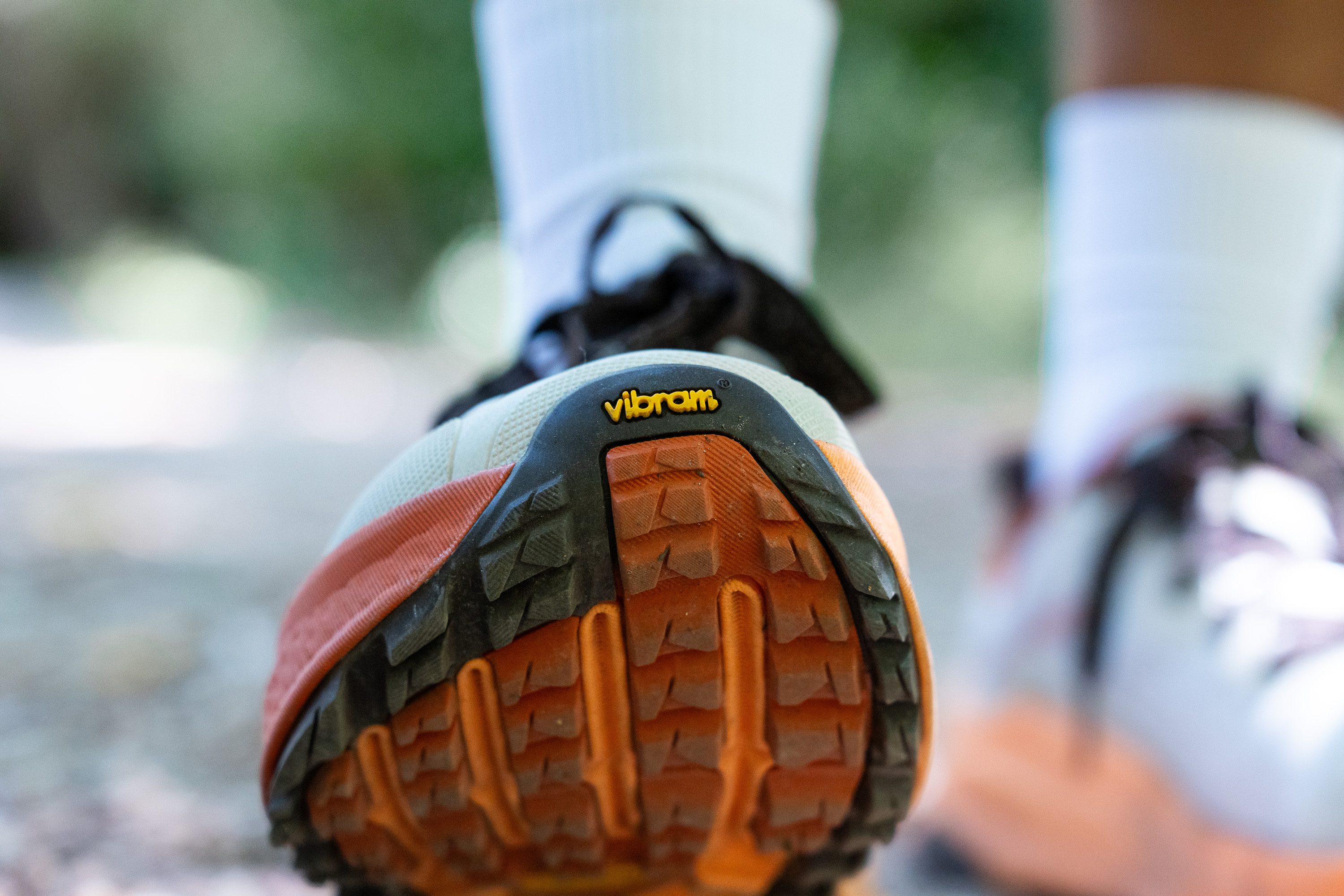
This 85.6-HC rubber from the Italian company, founded by mountaineering pioneer Vitale Bramani, is average in terms of hardness, which likely contributes to its strong durability.
From what we've tested, we can confirm that the grip is outstanding in both wet and dry conditions, an advantage further enhanced by the shoe’s substantial weight.
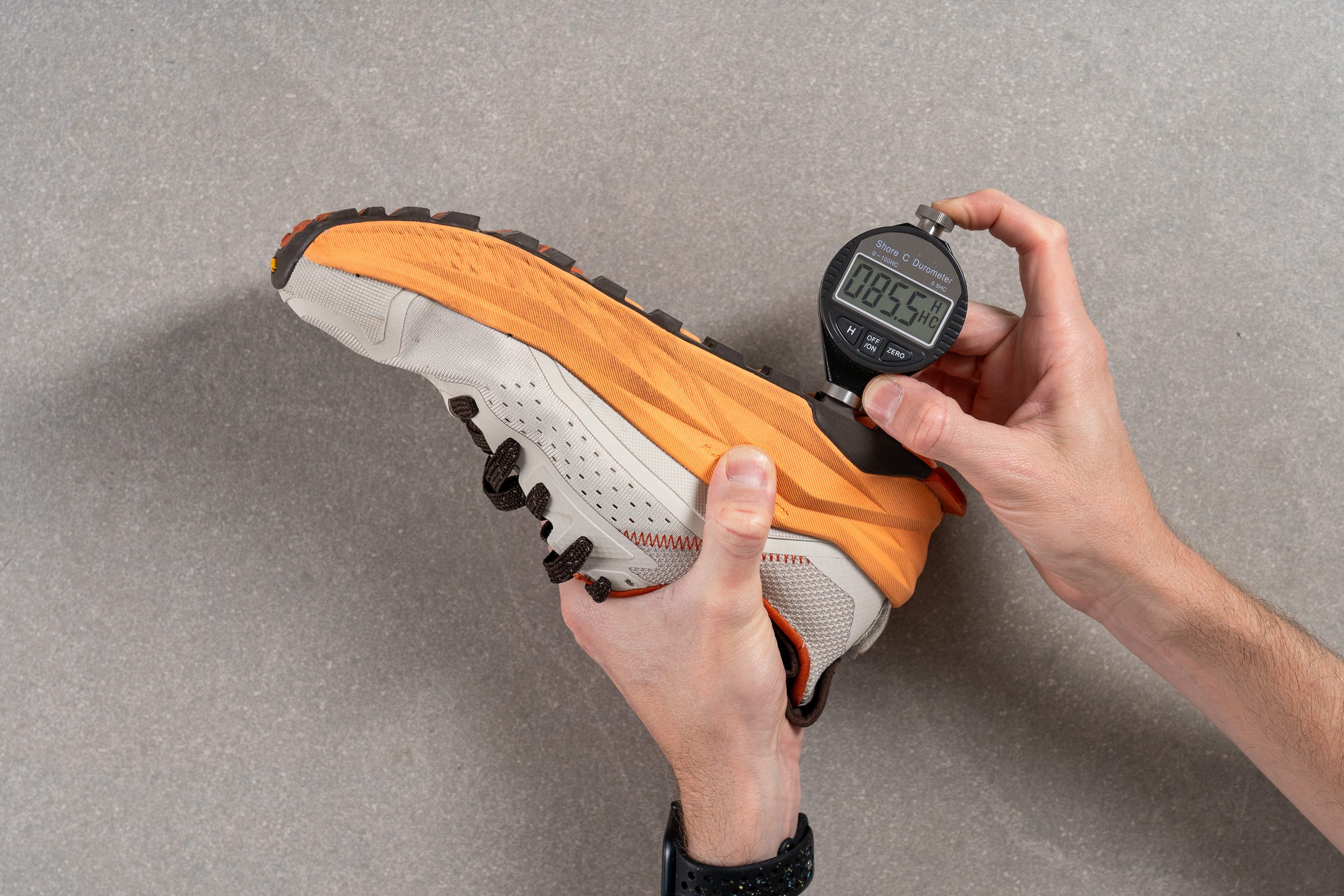
| Olympus 6 | 85.6 HC |
| Average | 85.8 HC |
Outsole durability
No matter how grippy an outsole is, if it wears out after just 300 miles, we can't endorse it for a premium trail shoe like this one.
Fortunately, our latest Dremel test on the Olympus 6 resulted in only a minor 0.8-mm dent in the rubber, confirming that durability is not a concern at all. Another box ticked!
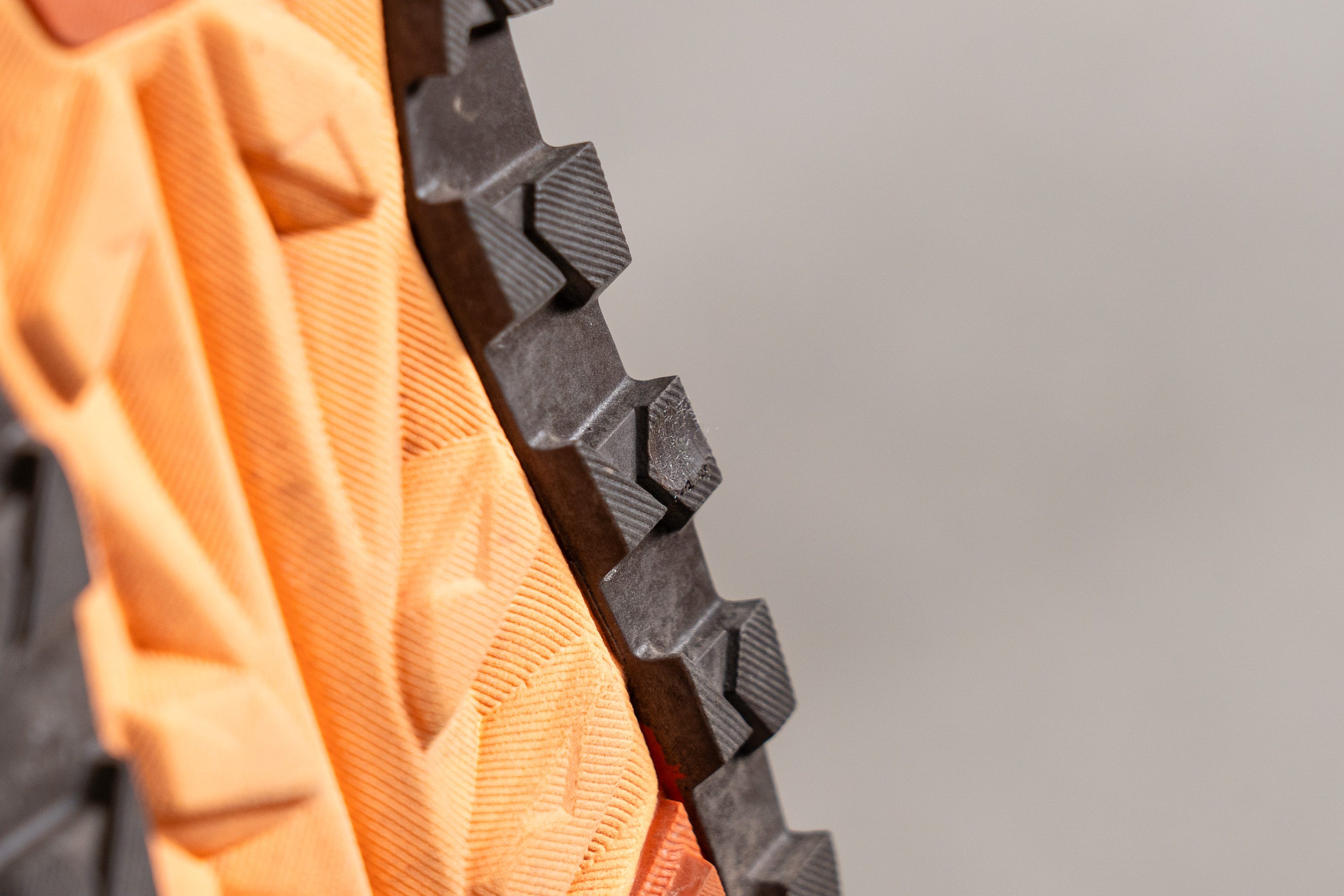
| Olympus 6 | 0.8 mm |
| Average | 0.9 mm |
Outsole thickness
We found that the outsole—excluding the lugs—is slightly thinner than what we usually see in trail shoes, yet it’s not a concern as it passed our durability tests without any issues.
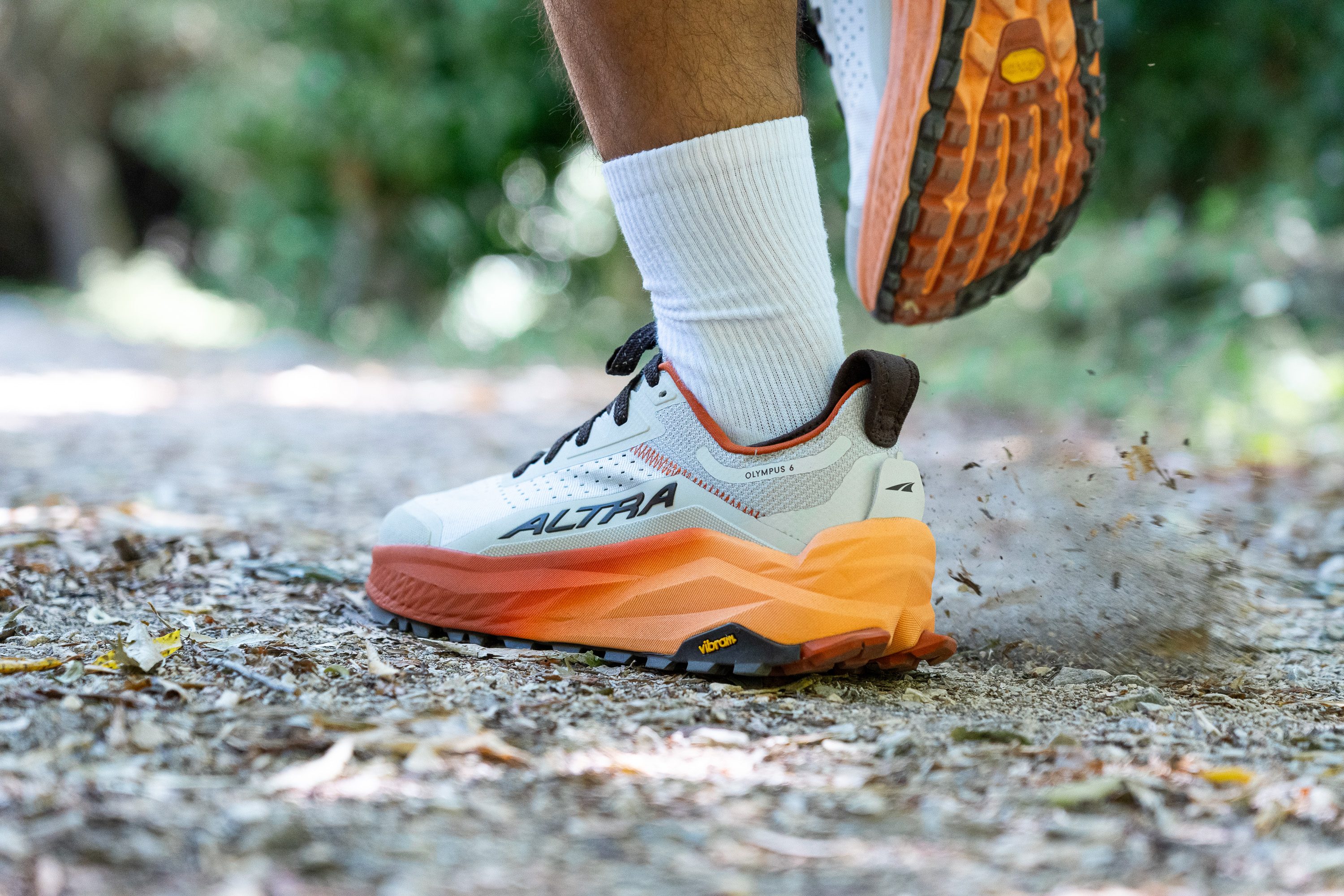
In fact, opting for a thicker outsole would have been unwise for Altra given the already substantial weight of this shoe. Speaking of which...
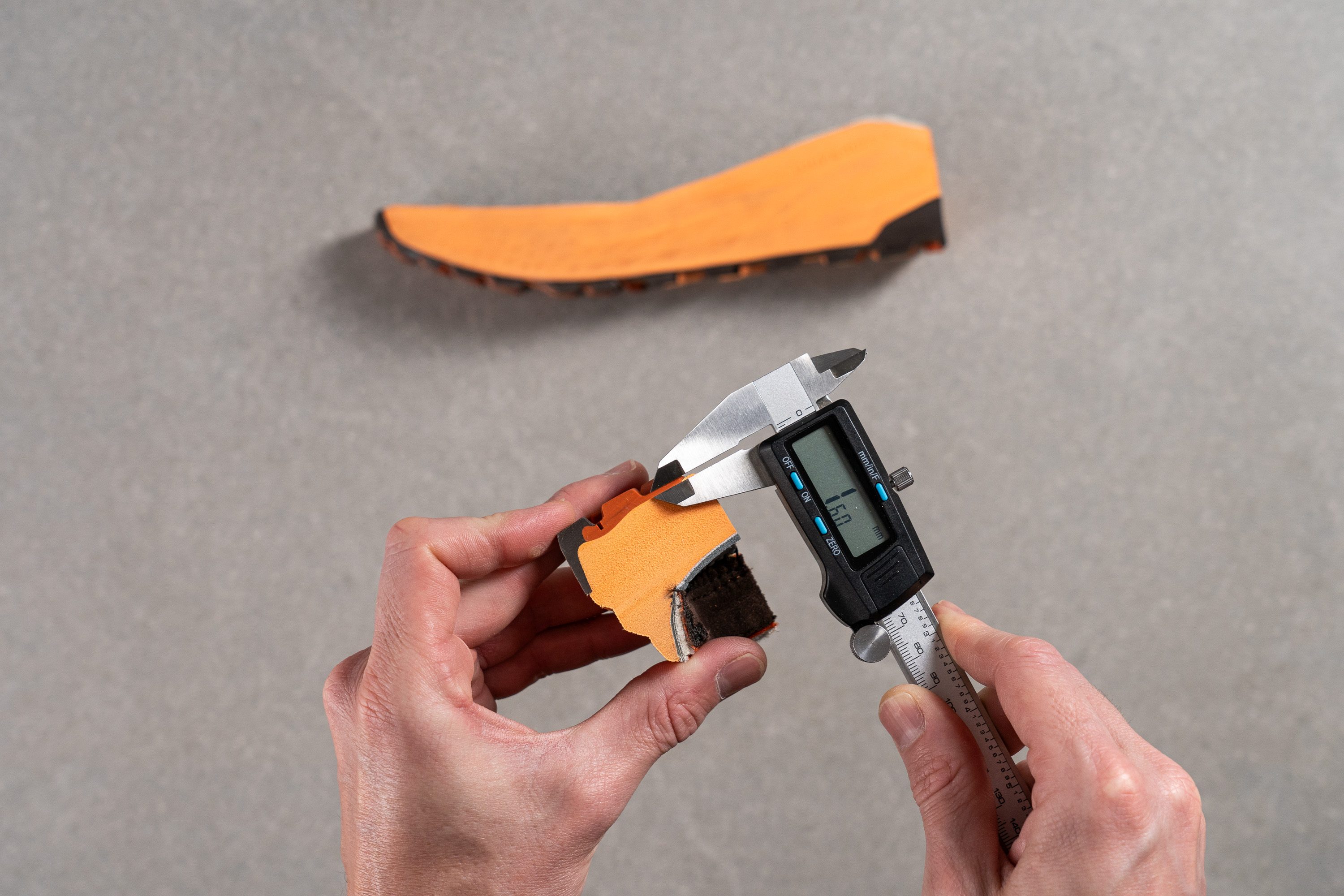
| Olympus 6 | 1.6 mm |
| Average | 2.2 mm |
Misc
Insole thickness
We discovered the insole to be slightly thicker than usual at just 5.0 mm.
Although it feels similar to other basic insoles and lacks distinctive features, we think it's one of those subtle areas where Altra could reduce weight in their next update.
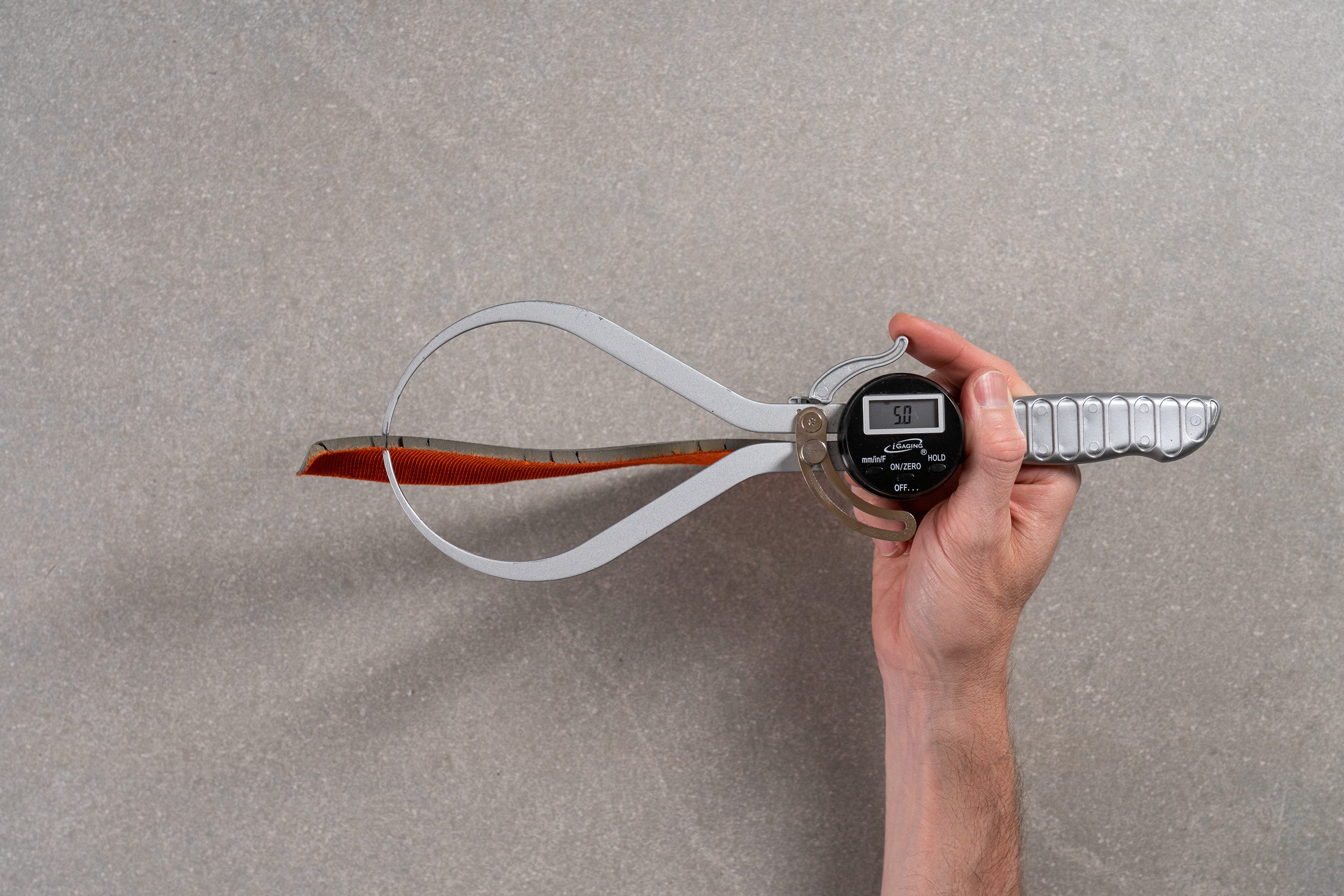
| Olympus 6 | 5.0 mm |
| Average | 4.7 mm |
Removable insole
You can easily swap the insole for an aftermarket one, but keep in mind that the foot-shaped toebox of the Olympus 6 might pose a challenge when fitting a third-party footbed.
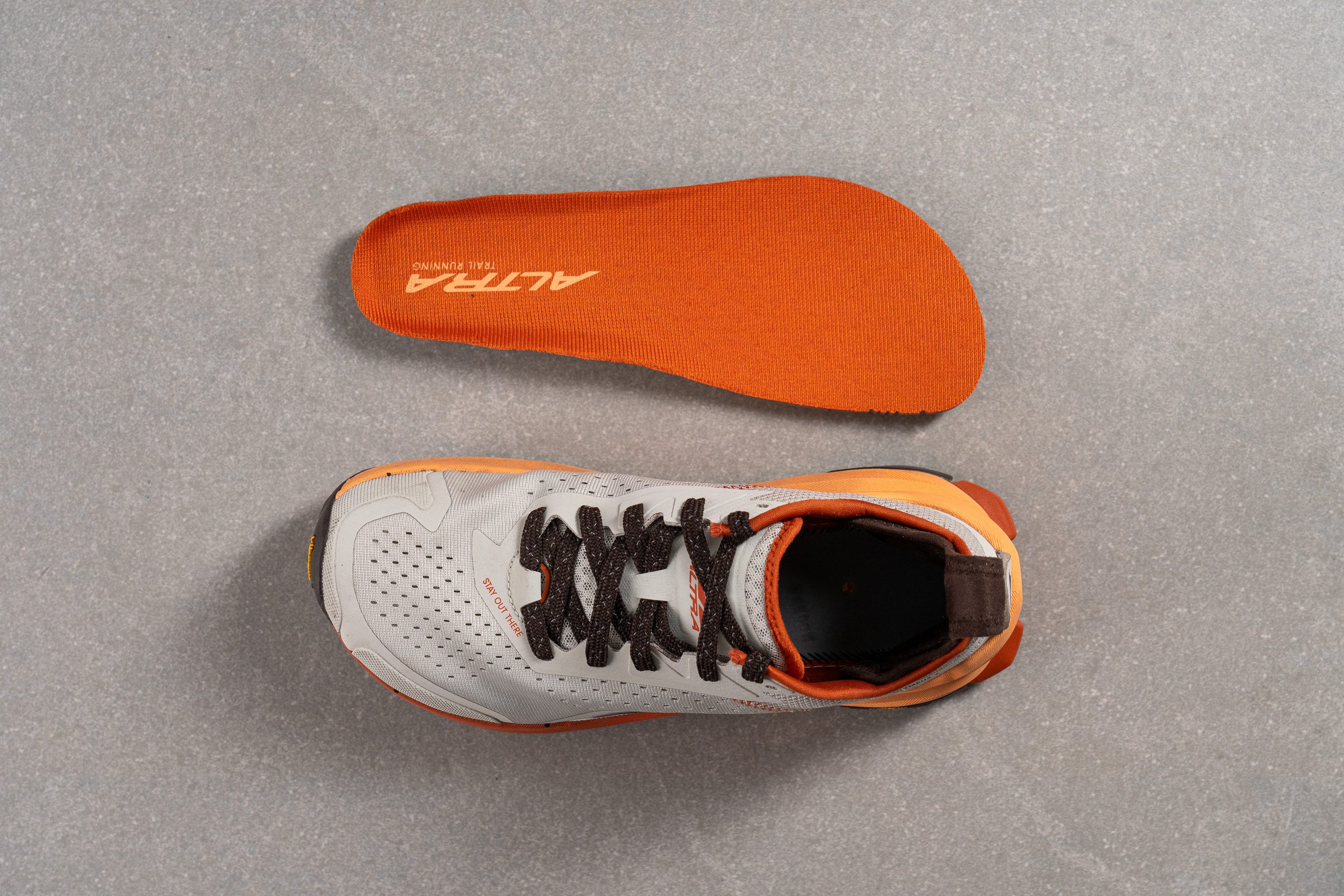
| Olympus 6 | Yes |
Midsole softness in cold (%)
During a 20-minute test in our freezer, the softness of the CMEVA foam saw a modest change of only 28.8%, a nice outcome considering its formulation!
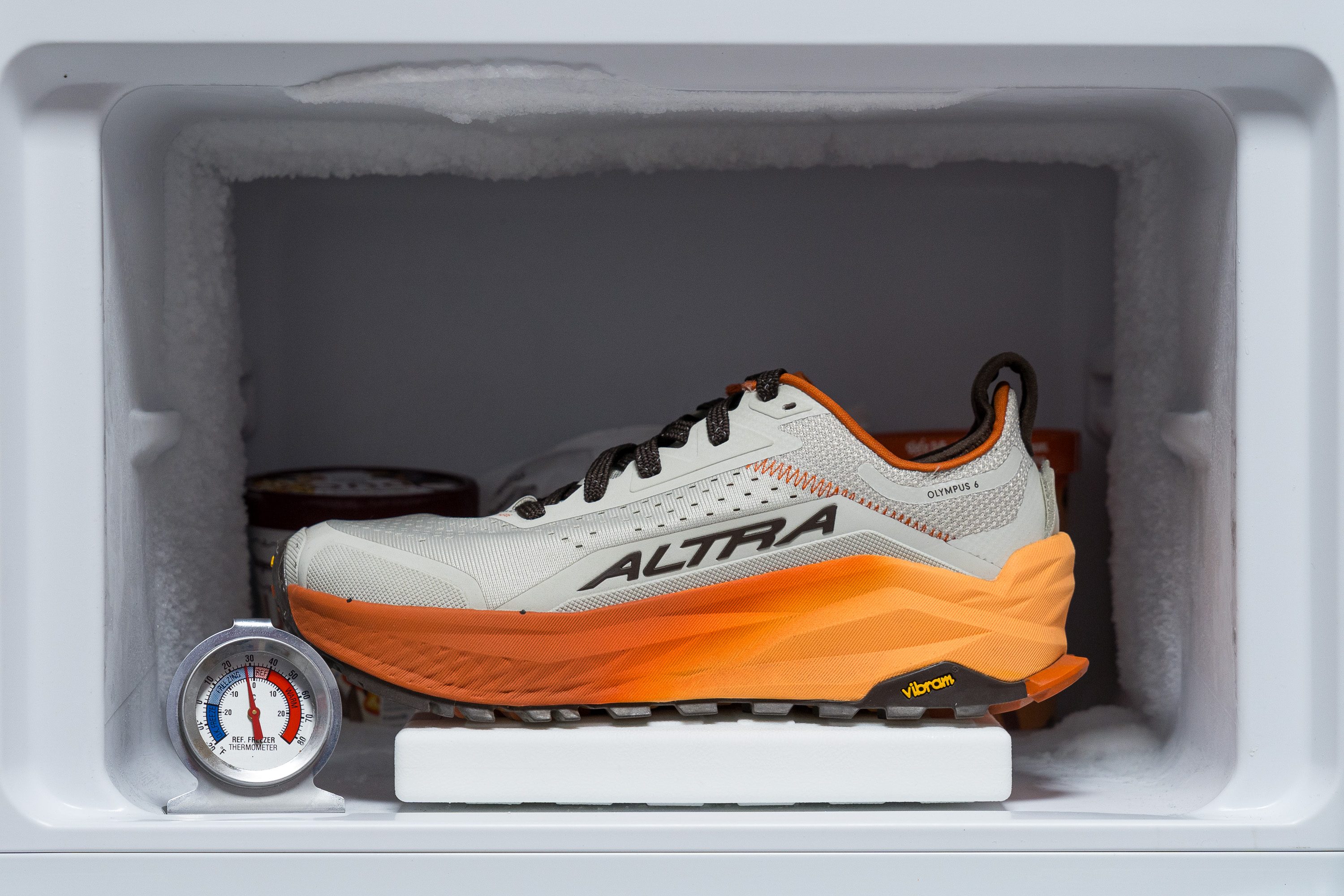
| Olympus 6 | 29% |
| Average | 26% |
Reflective elements
If there’s one thing we appreciate here at RunRepeat, it’s when brands go the extra mile with reflective elements on trail running shoes. We’re of the opinion that visibility matters, and Altra nailed it this time. We discovered that even the laces reflect light—an impressive detail!
| Olympus 6 | Yes |
Tongue padding
Everything about the Olympus 6 is big, and the tongue is no exception. At 10.2 mm of padding, we found it incredibly cushy and plush—a dream for those who love to tighten their laces without feeling any discomfort on the instep.
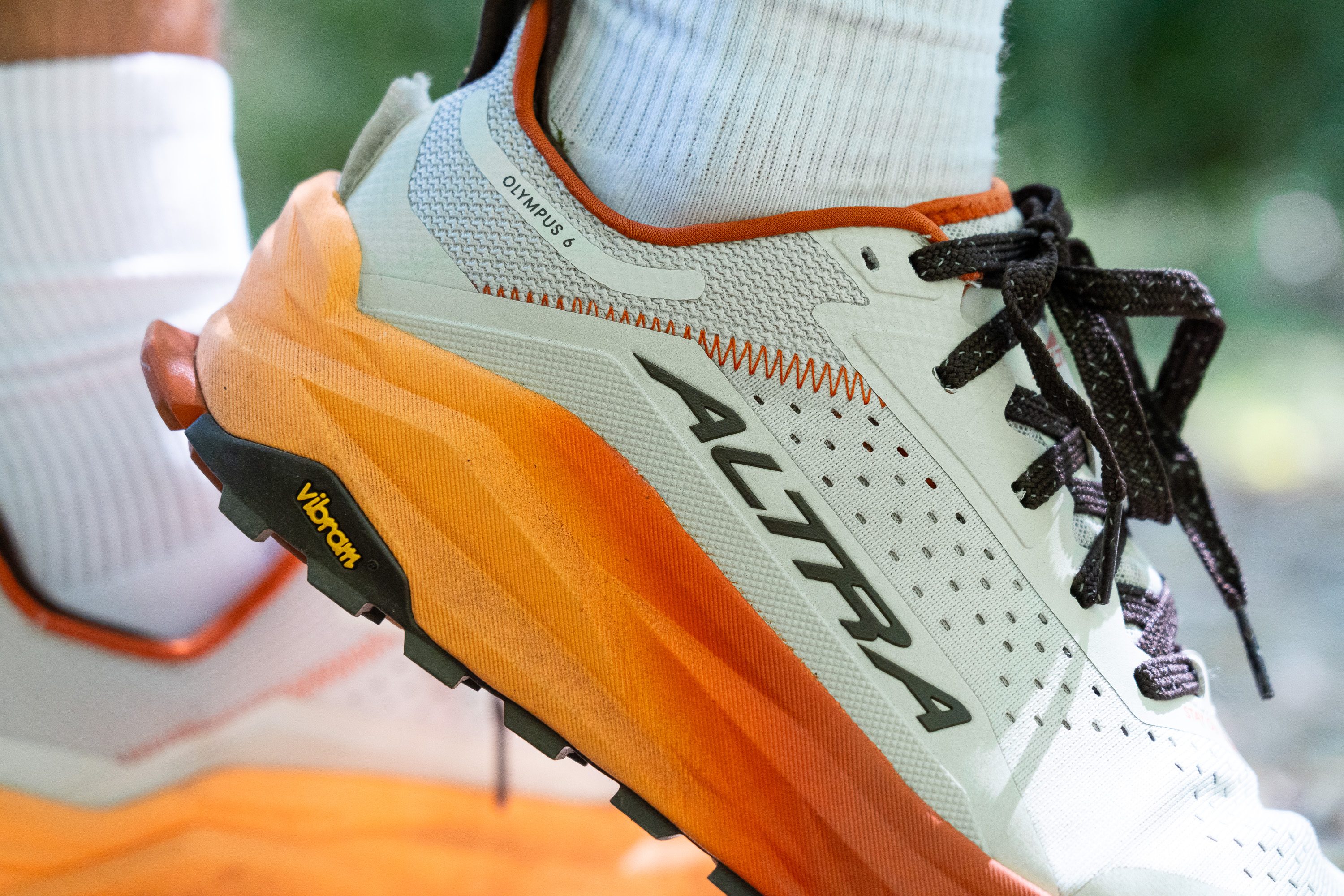
The lacing system is another standout feature. From our perspective, the punched eyelets, including an extra one for added versatility and ankle security, combined with fantastic flat laces, offer an exceptional fit.
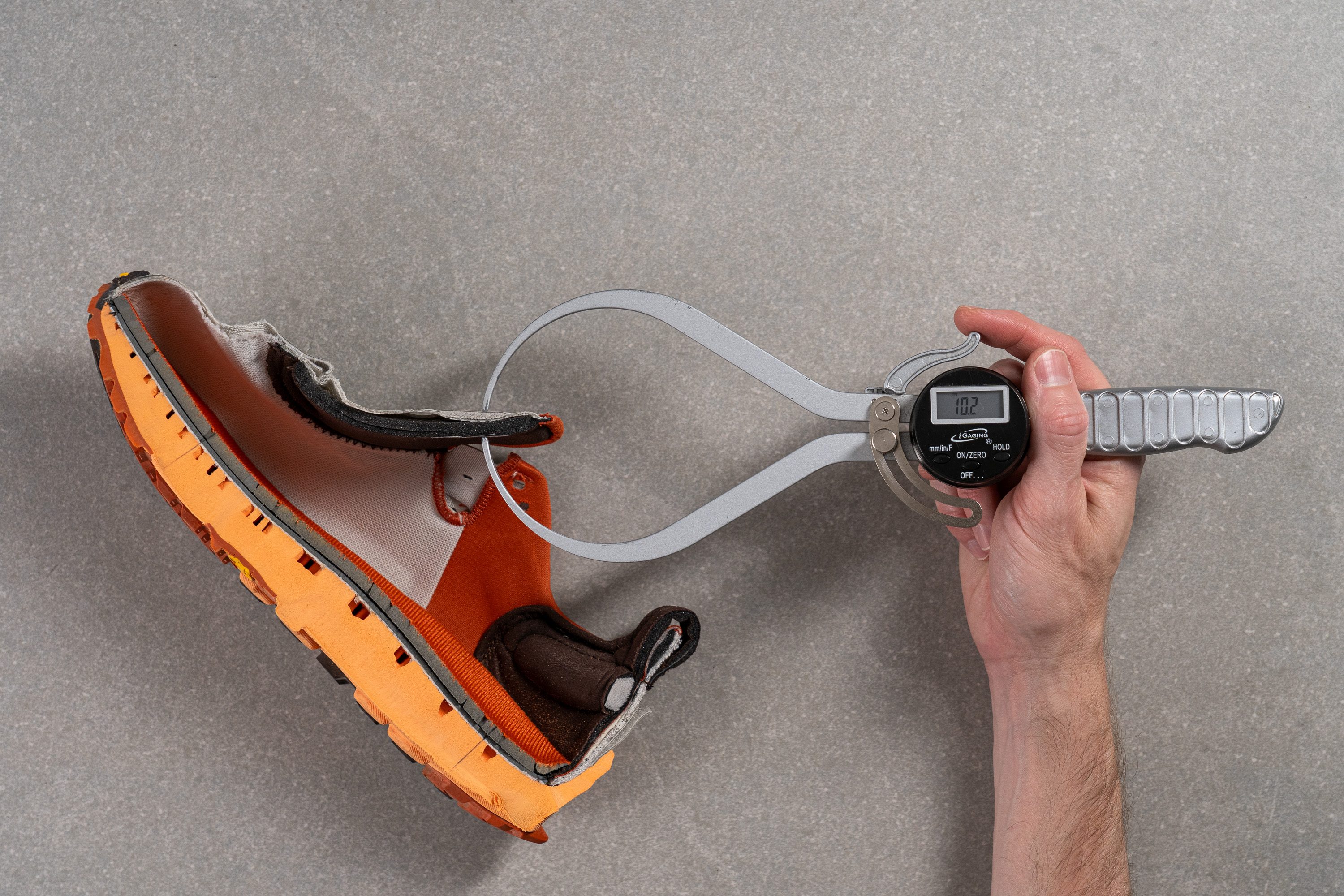
| Olympus 6 | 10.2 mm |
| Average | 6.4 mm |
Tongue: gusset type
A proper trail running shoe over $100 should include a gusseted tongue, and we were pleased to find the Olympus 6 delivers. The fully fixed tongue prevents debris and dust from entering the toebox, enhancing comfort and performance on rough terrains.

| Olympus 6 | Both sides (full) |
Heel tab
The heel of the Olympus 6 includes a well-designed, high-quality, practical heel tab that we found to be a great addition. In our view, it's those small but thoughtful details that help justify the premium price of this model.
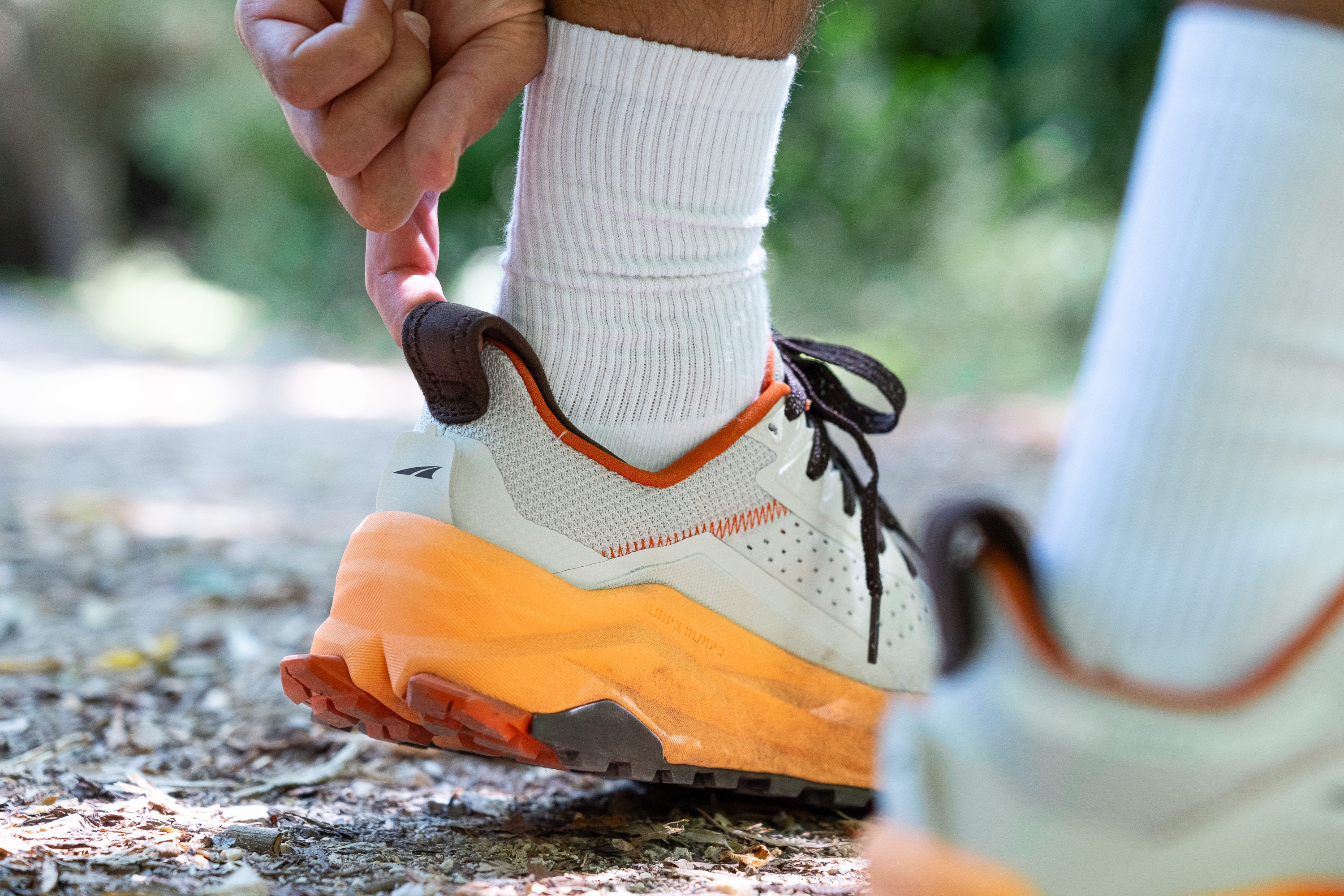
| Olympus 6 | Finger loop |
Price
The Olympus 6 comes in at a higher price point than most Altras, but it offers unique features you won’t find in any other trail shoe from the brand. Unfortunately, it did see a slight price increase from the v5, which we’re not thrilled about, but when adjusted for inflation—it’s not too bad!
| Olympus 6 | $175 |
| Average | $153 |
GaiterTrap
The velcro strap at the back is designed to easily attach ankle gaiters. It's made for Altra's GaiterTrap proprietary system, but it works brilliantly!
